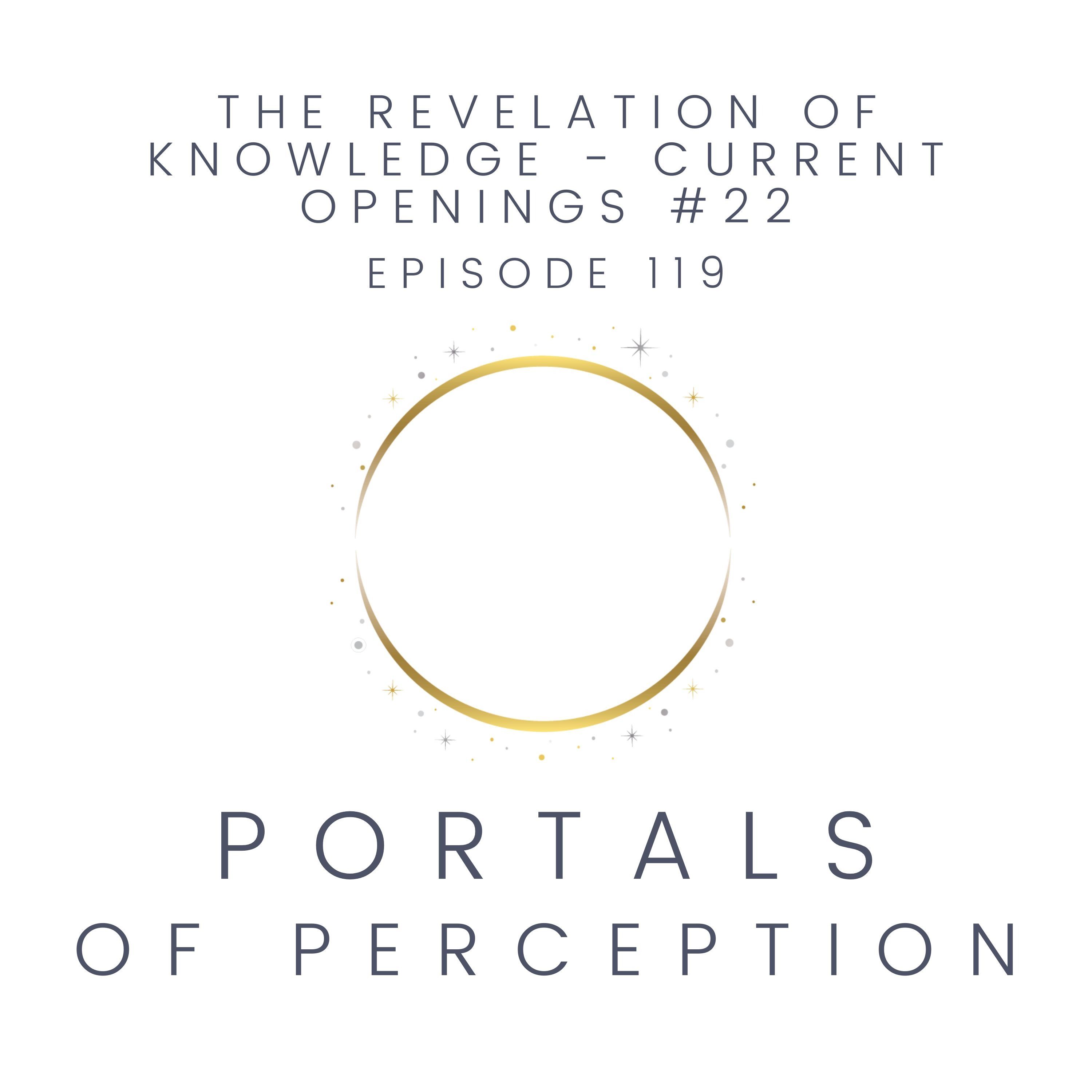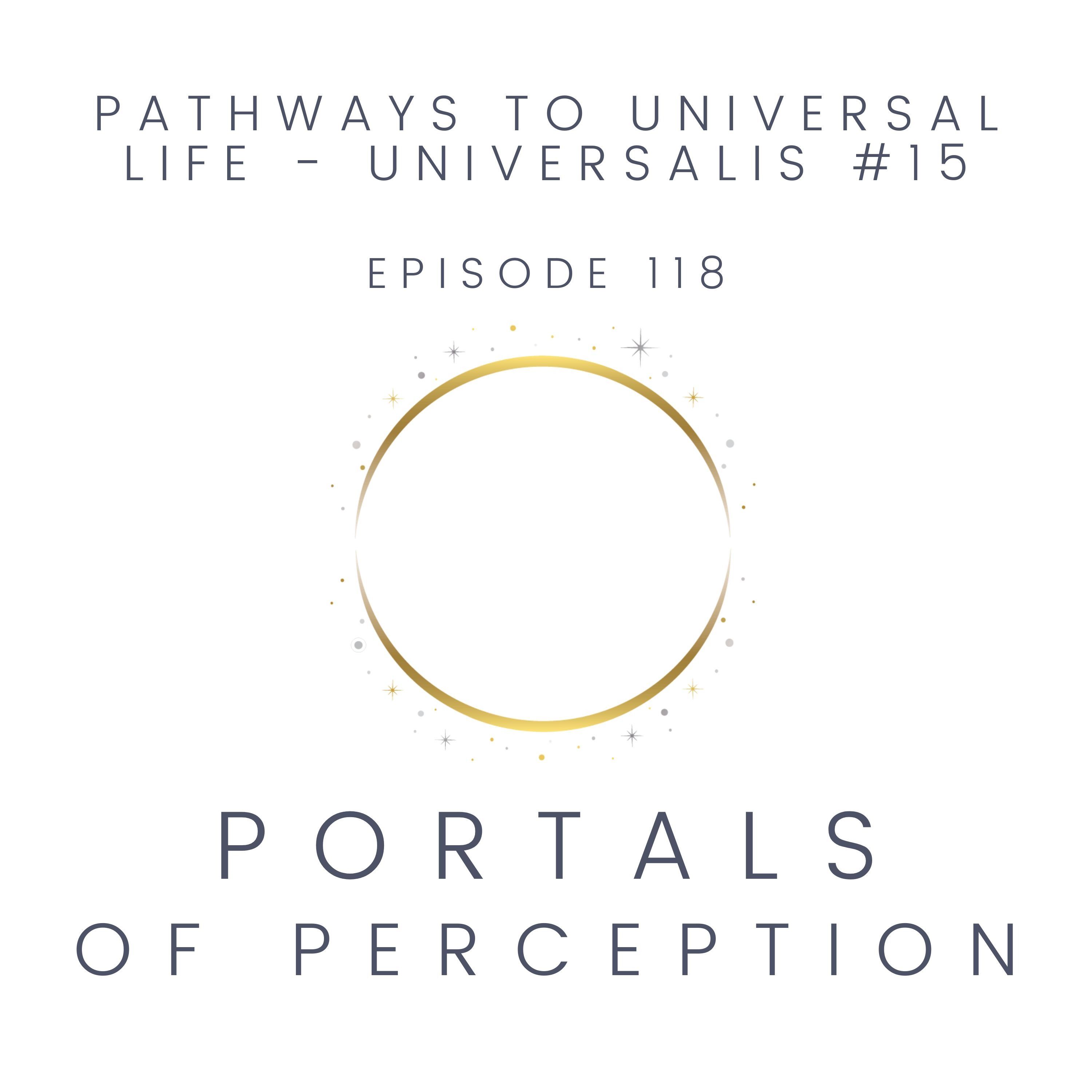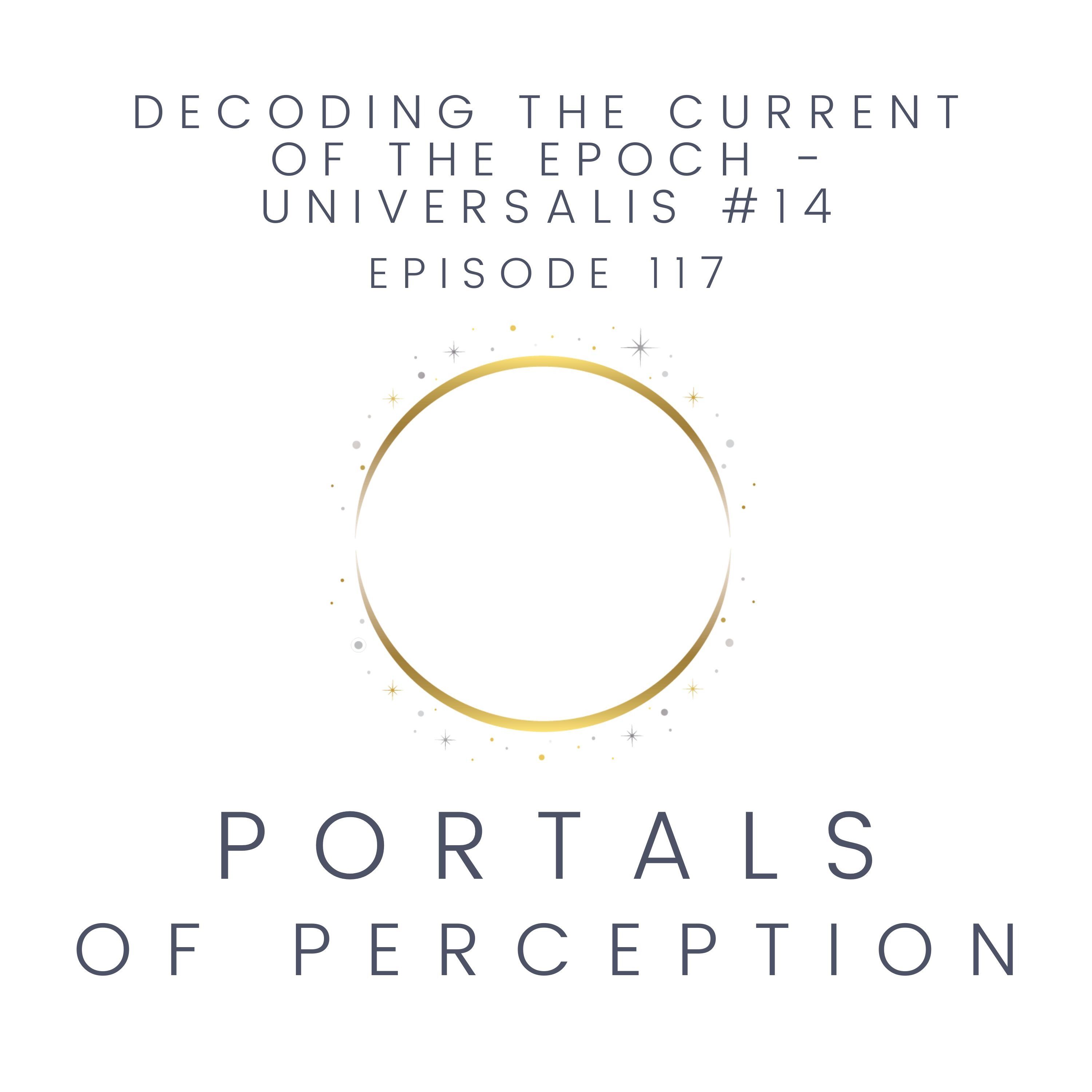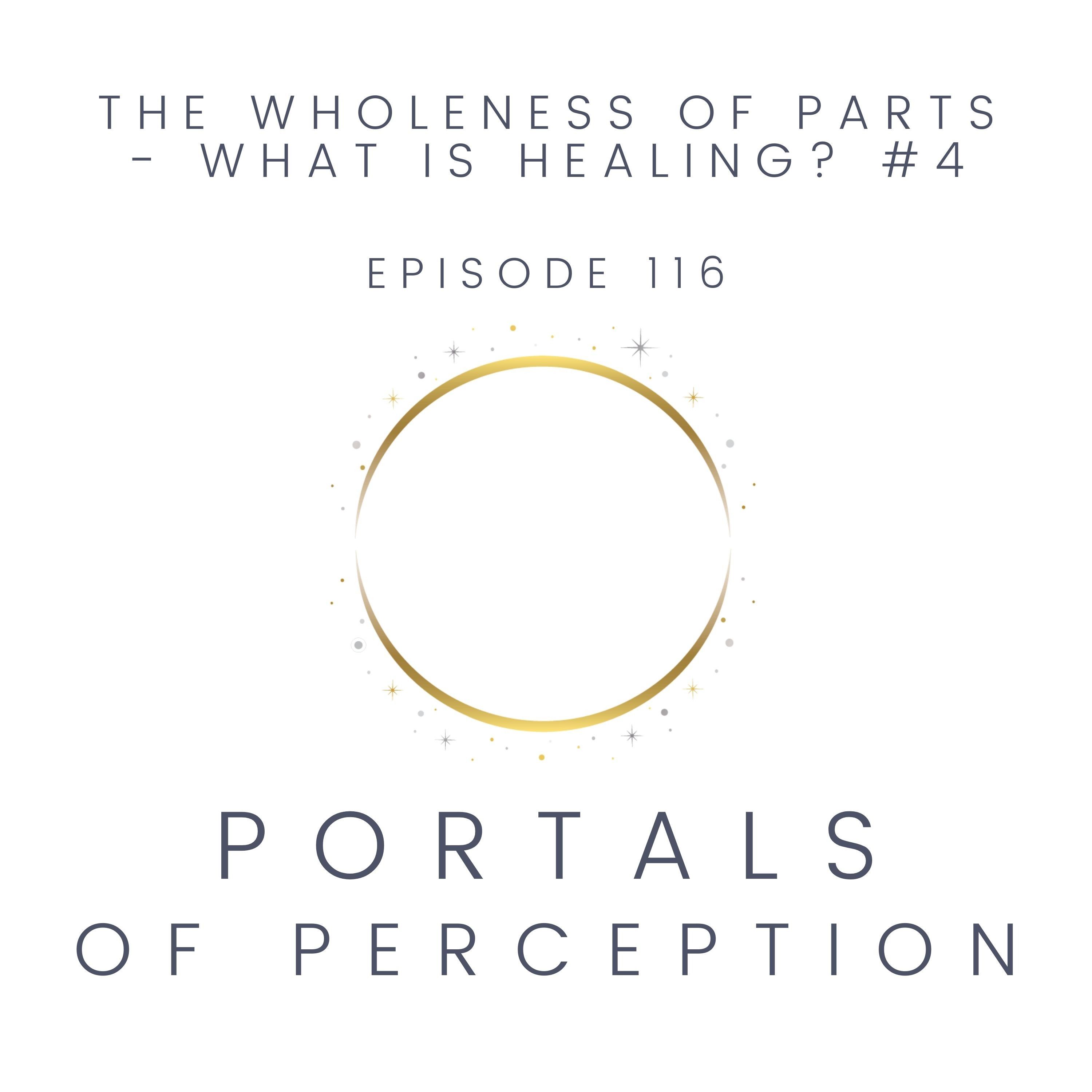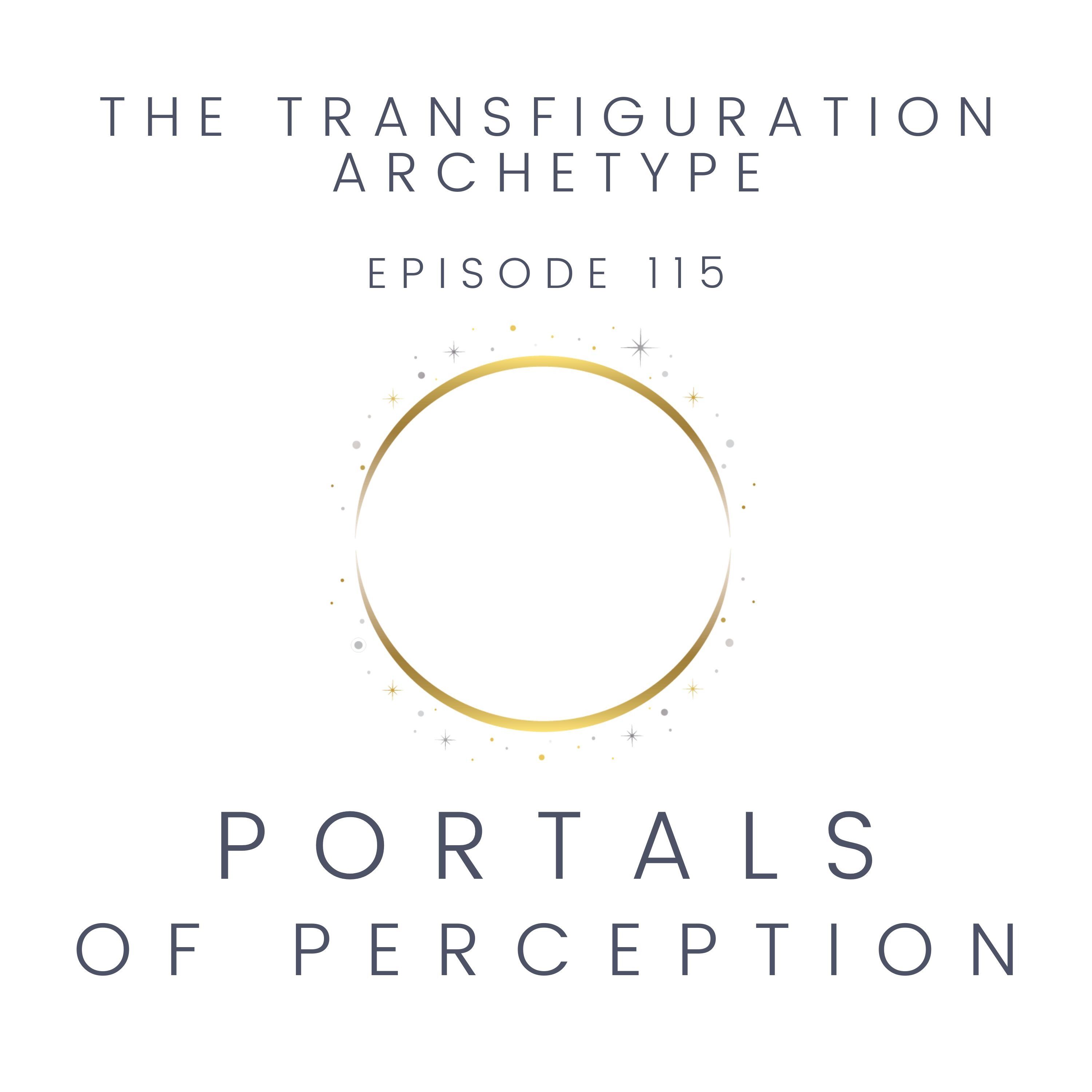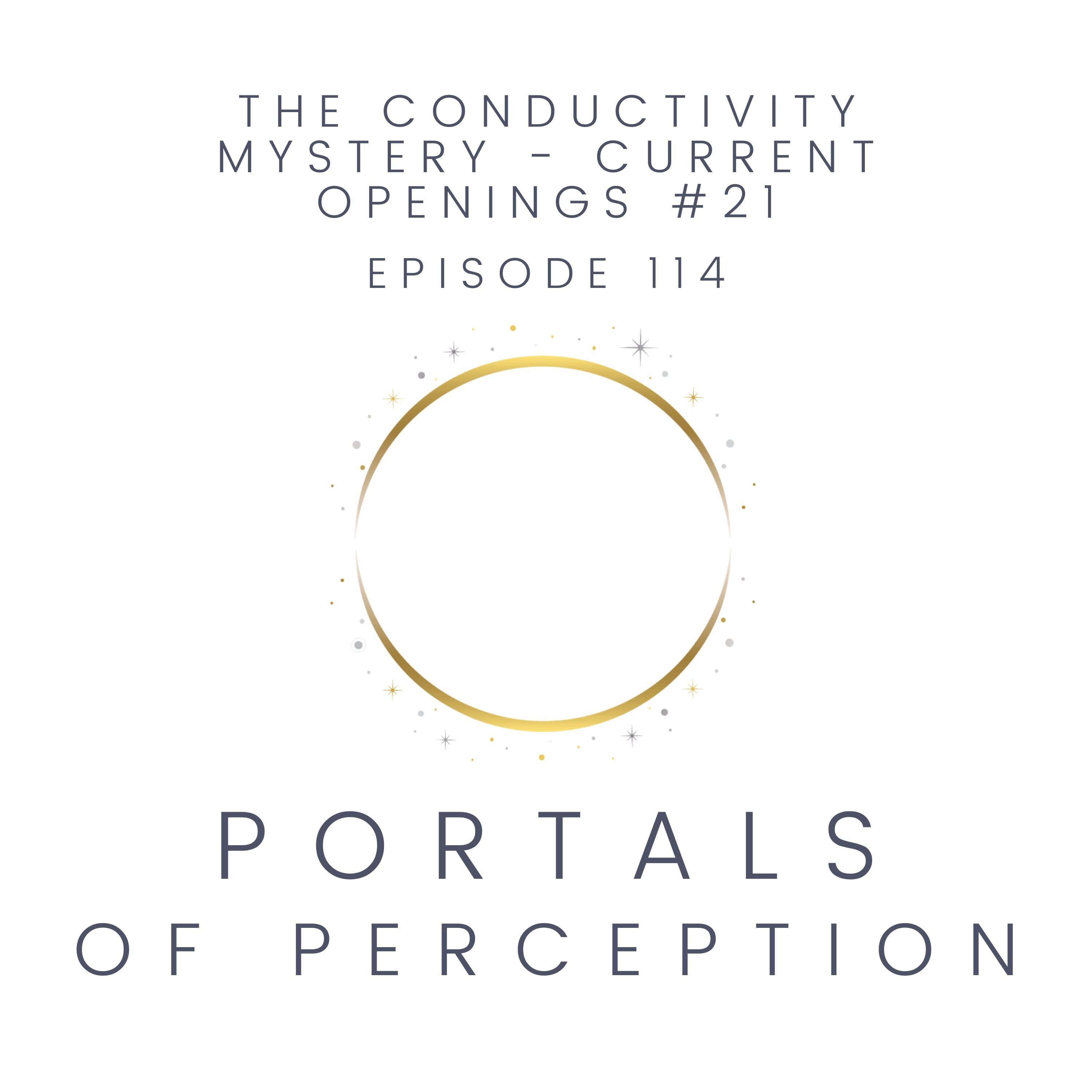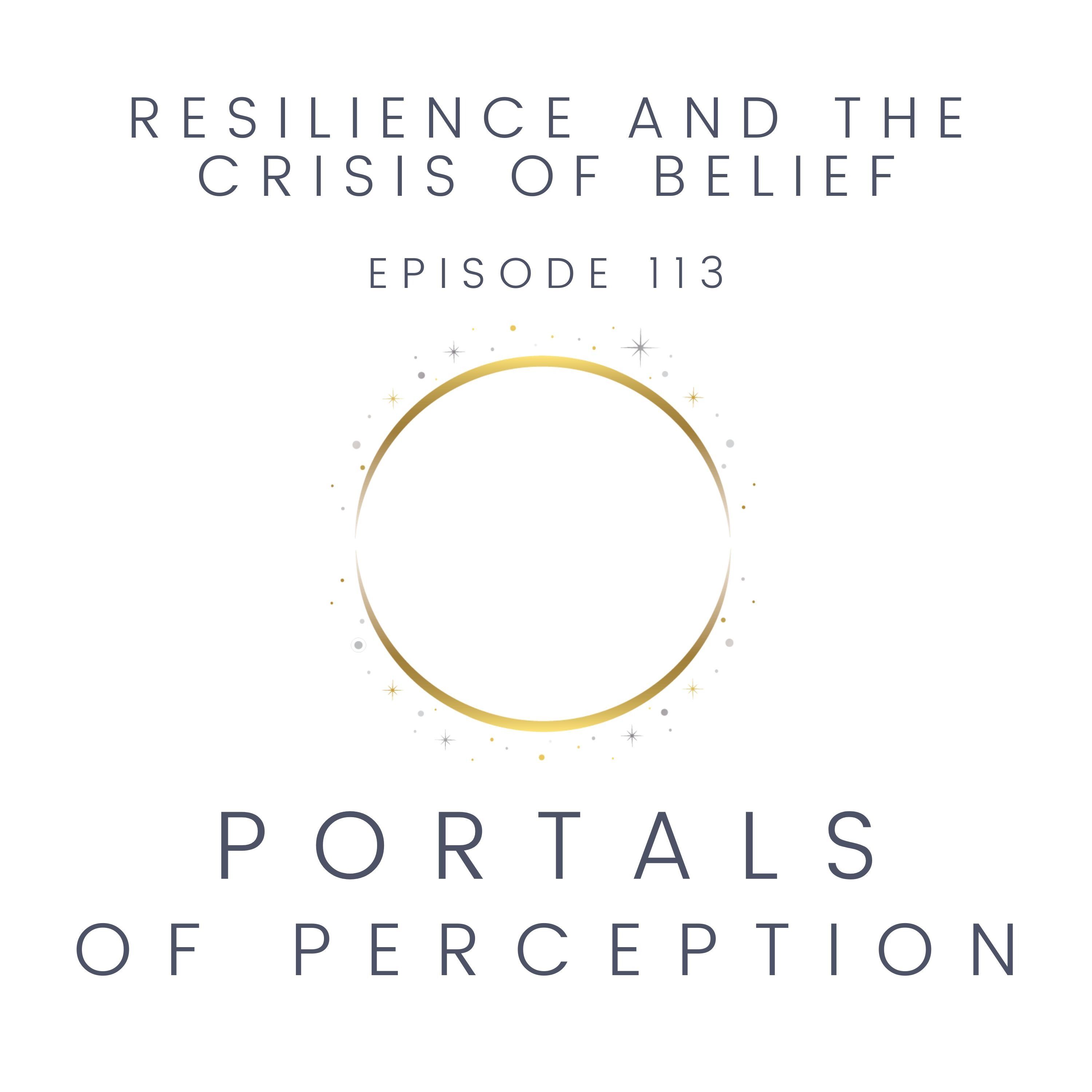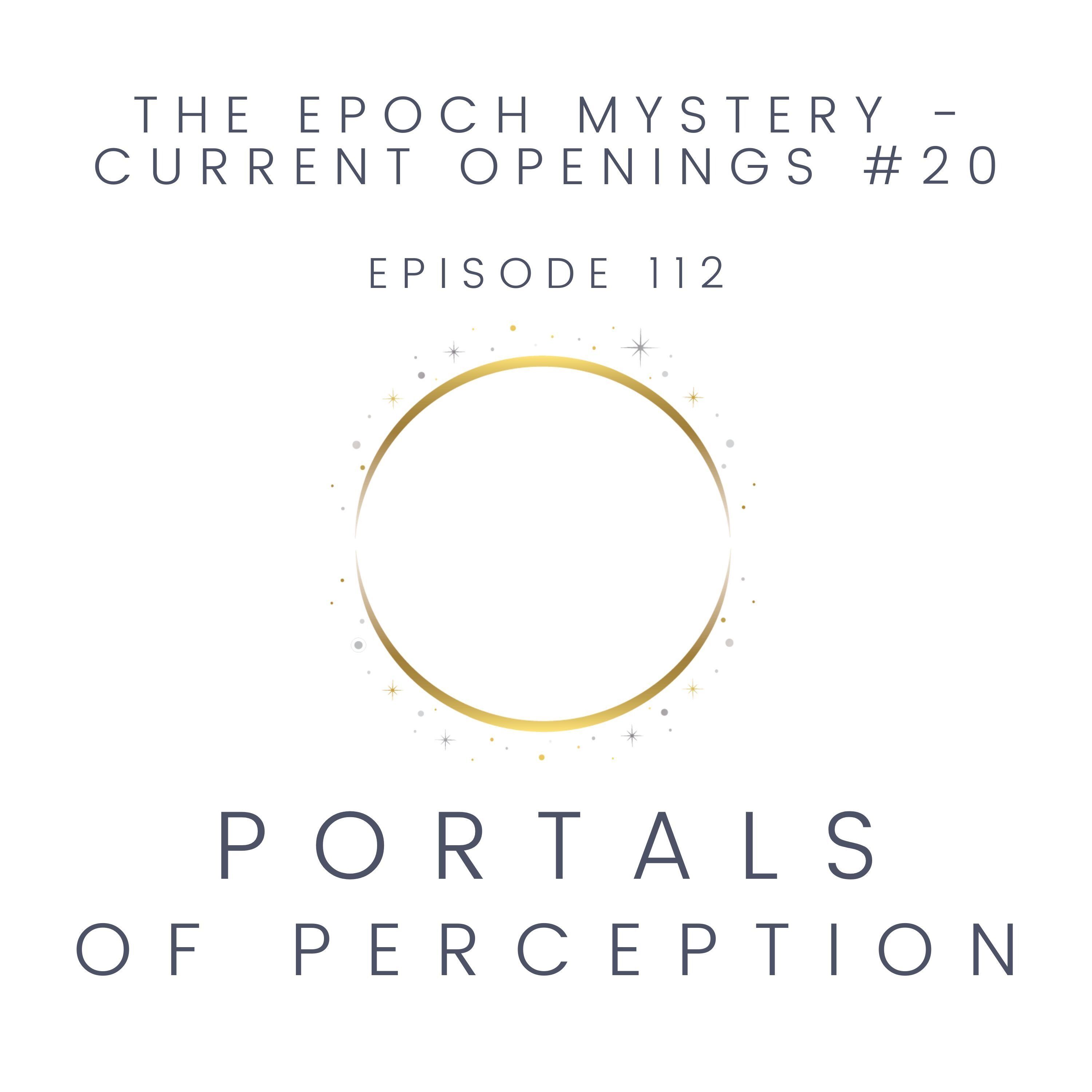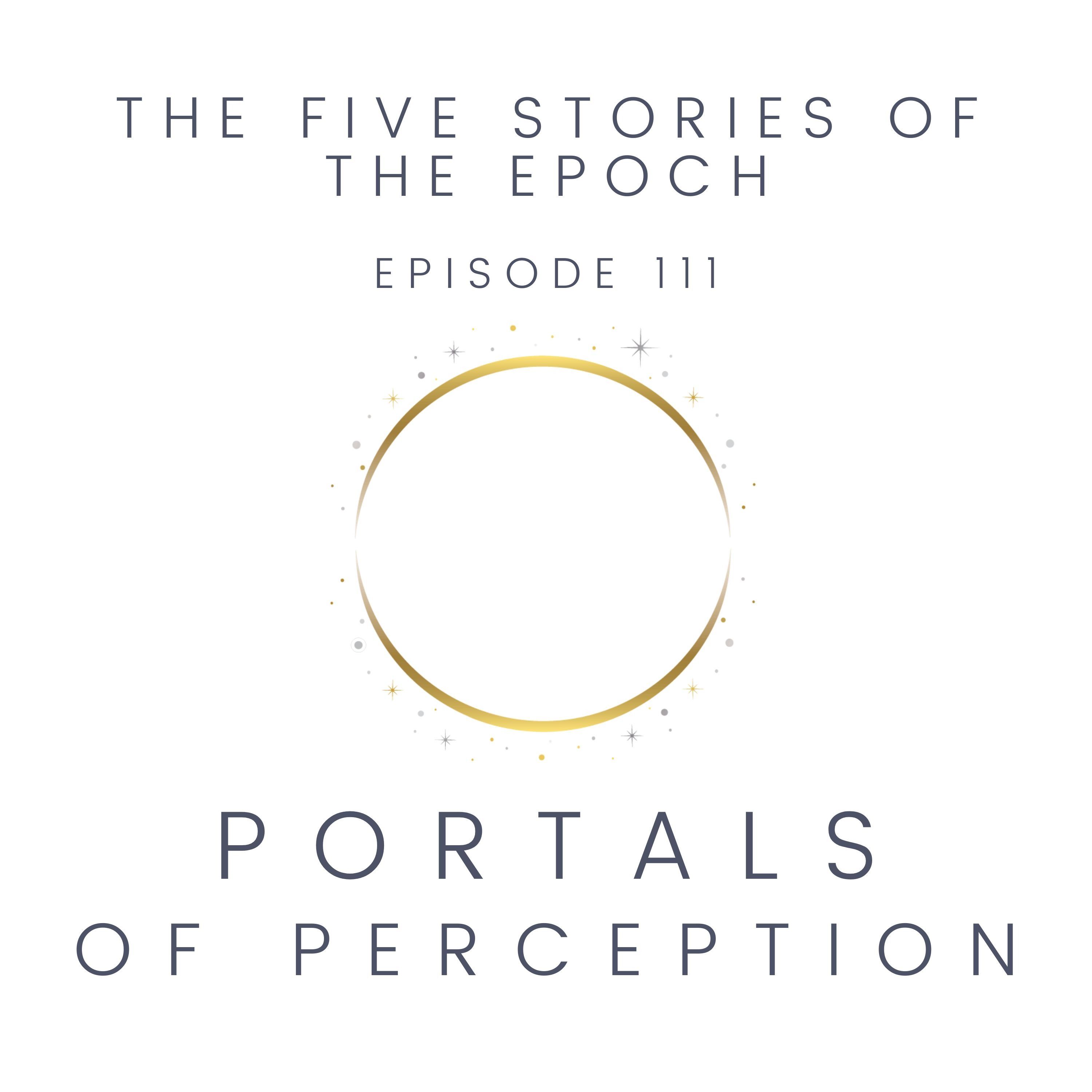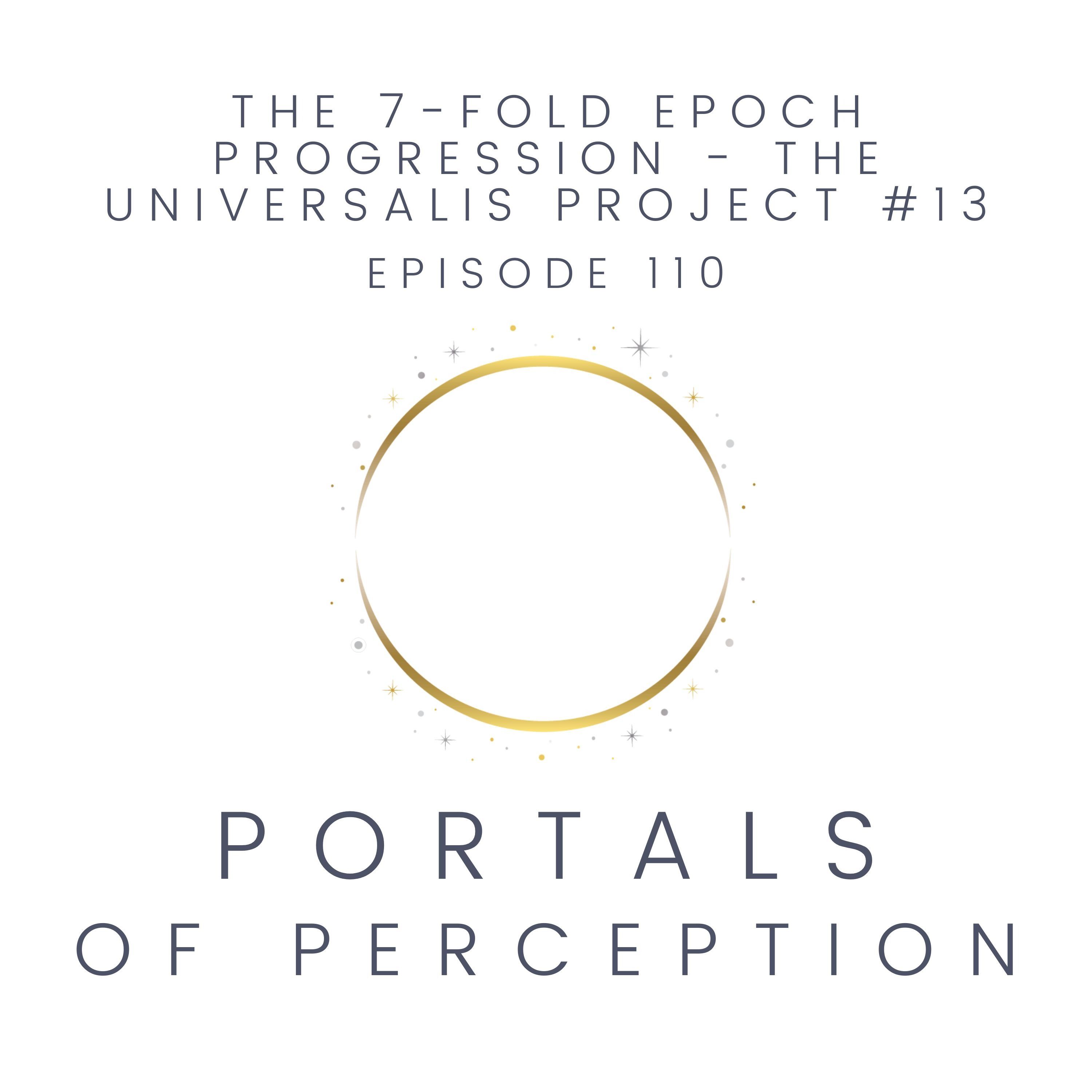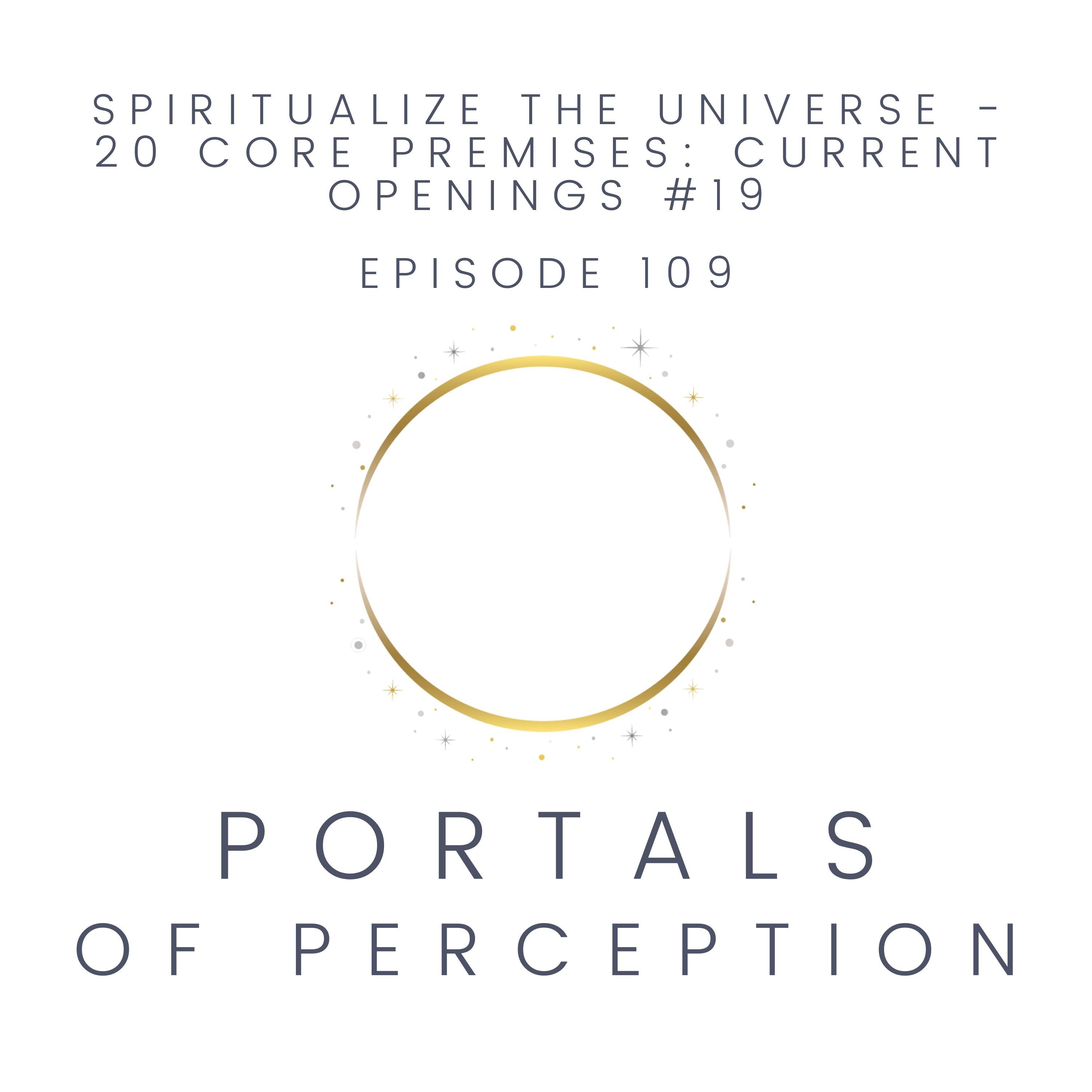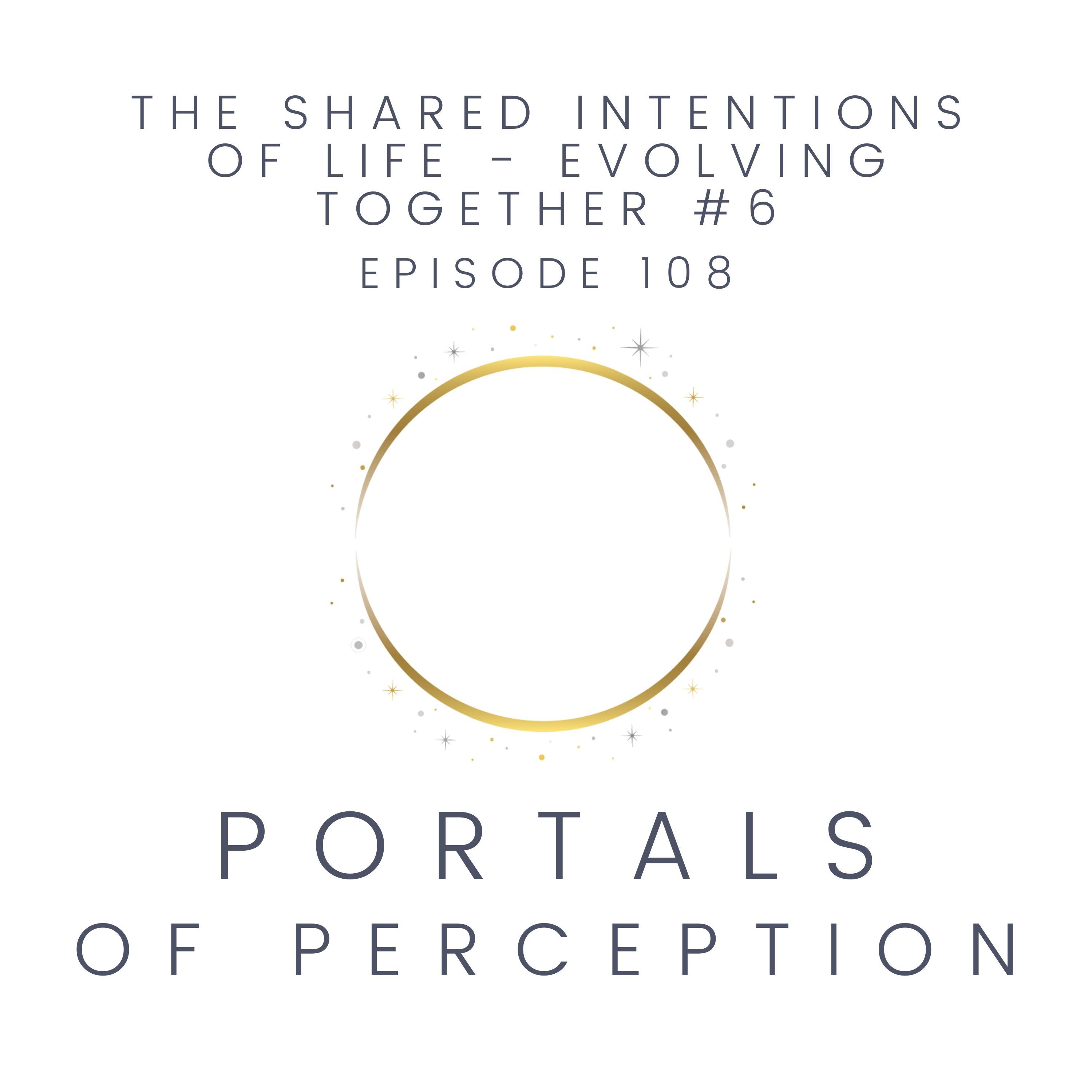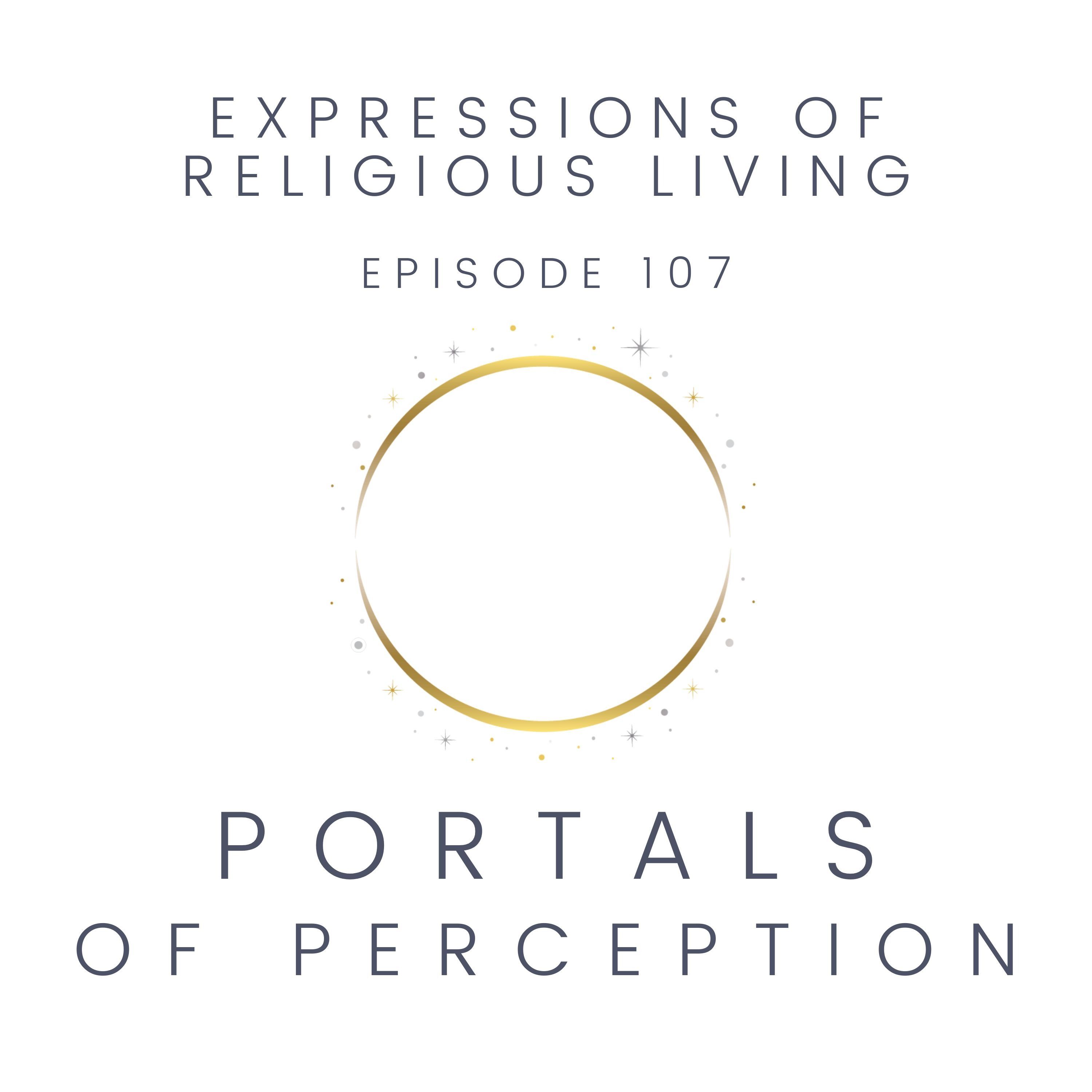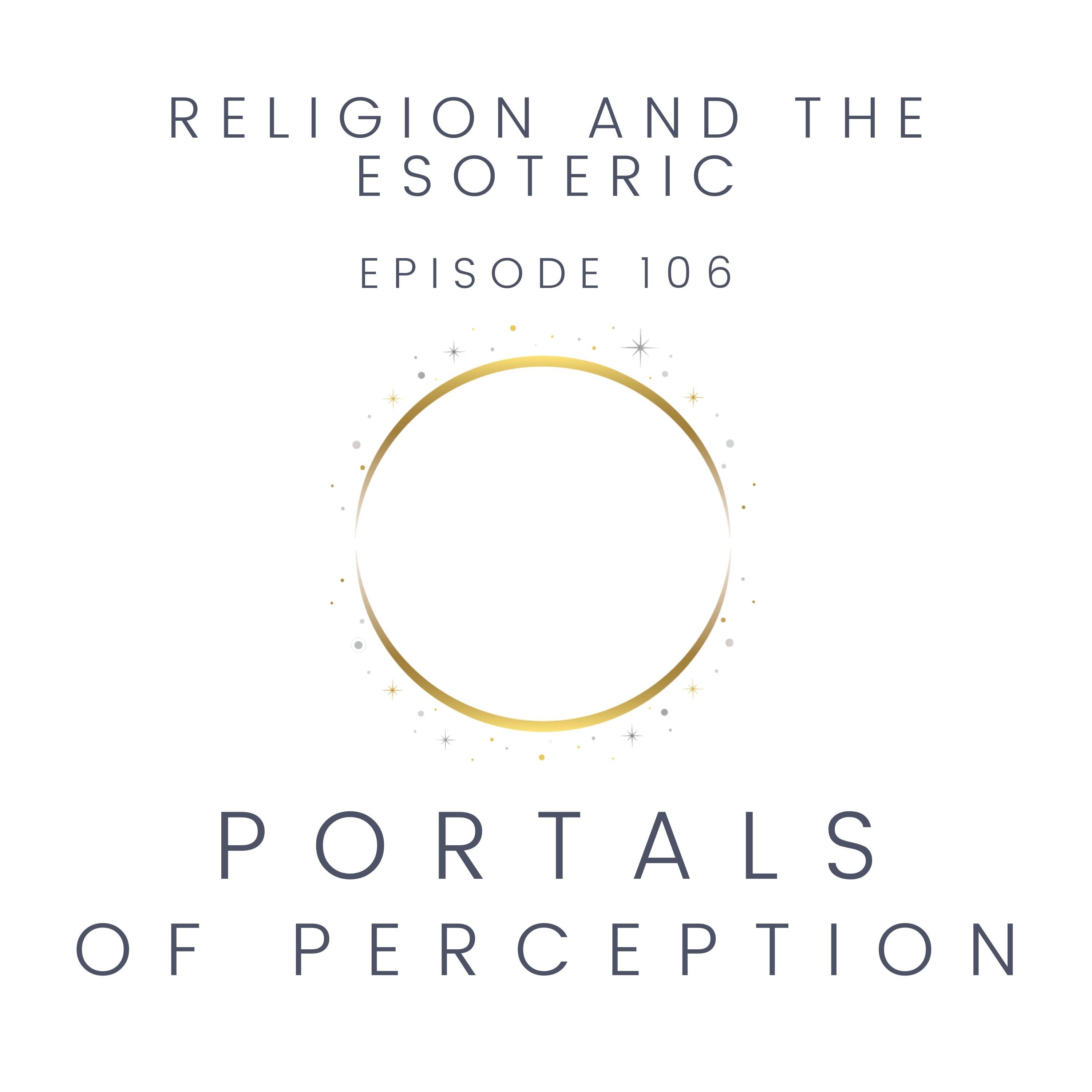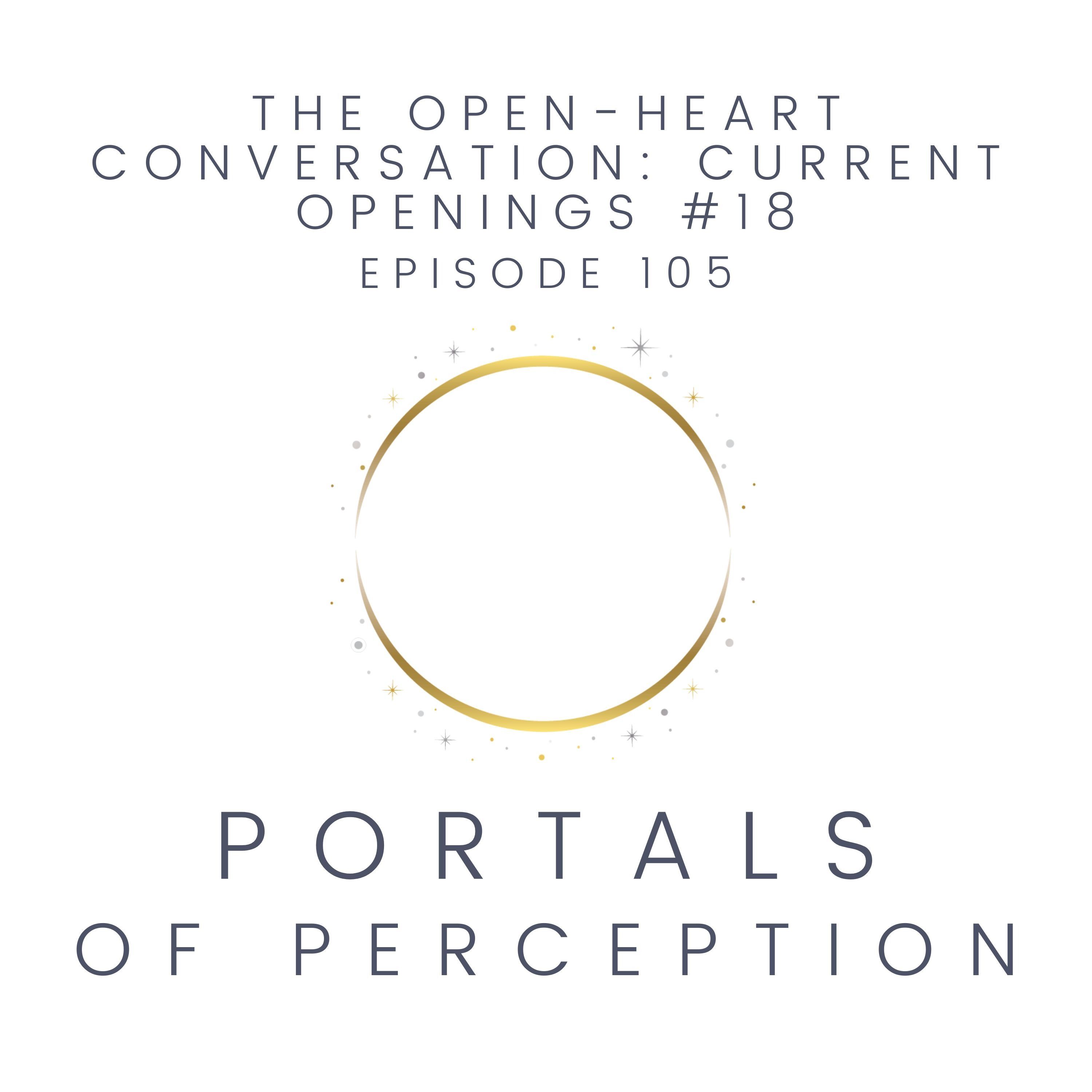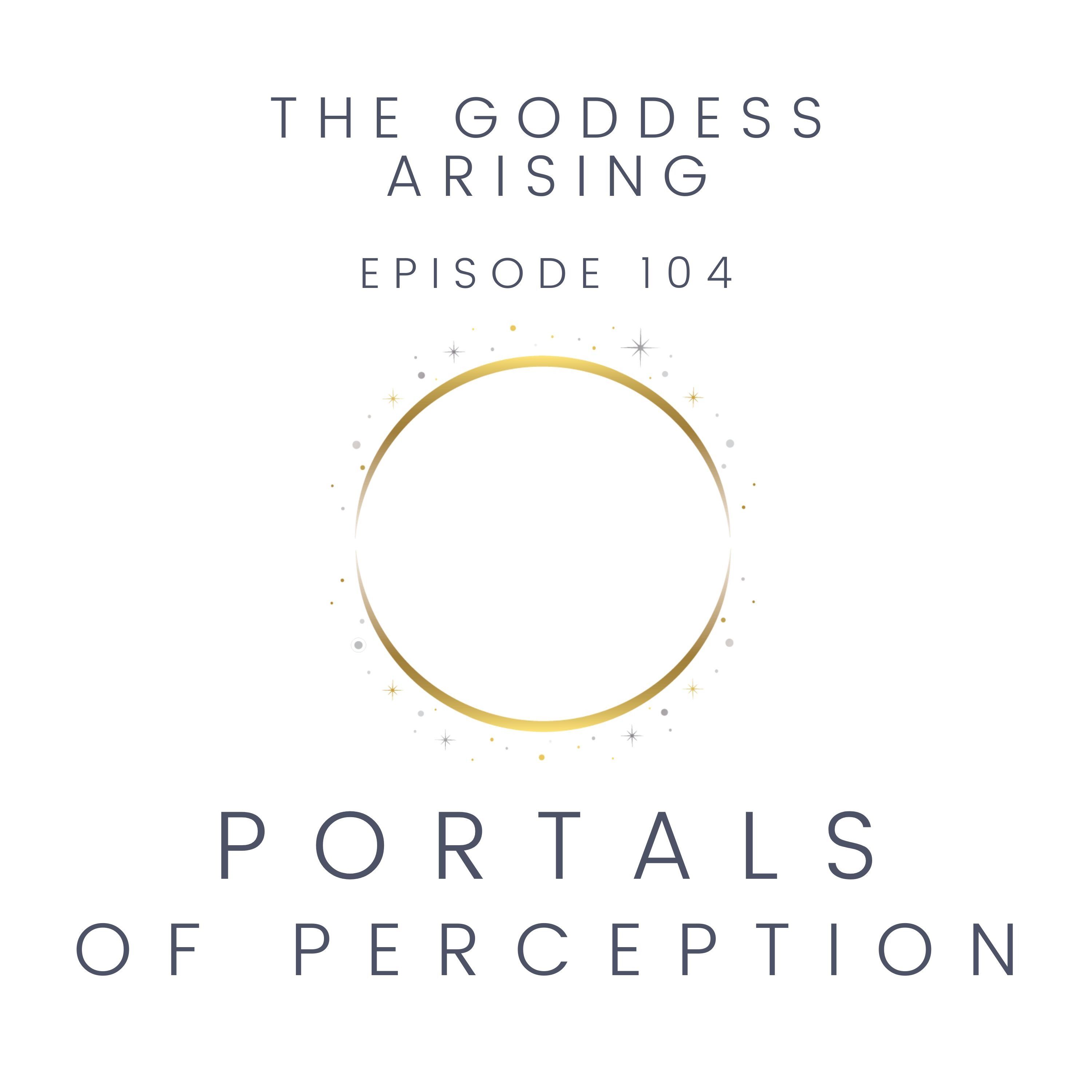Discover Portals of Perception
Portals of Perception

Portals of Perception
Author: Aviv Shahar, Peter Barry
Subscribed: 4Played: 21Subscribe
Share
© 2021 Portals of Perception
Description
Portals of Perception endeavors to create conversations at the frontier of discovery, and to bring to life the natural processes of human development. Each of us, by design, can become a living agency for the evolutionary process, as it arises, through our living expression, and can become an intentional participant in the emergence of a wiser future.
Join our hosts Aviv Shahar and Peter Barry every week for conversations on a wide variety of topics including human purpose, personal development, evolution and the future, community of conversation and discovery, and more.
Join our hosts Aviv Shahar and Peter Barry every week for conversations on a wide variety of topics including human purpose, personal development, evolution and the future, community of conversation and discovery, and more.
120 Episodes
Reverse
How do we acquire, assimilate and verify knowledge?Exploring an inquiry as old as the human capacity to search for truth, which is re-enlivened in our times with the many challenges facing the human family globally, Aviv Shahar and David Price Francis invite us into a journey of discovery, tracing fascinating new pathways toward integrated understanding.They begin with the awareness that scientific inquiry has opened a world of astonishing can-do possibilities, while also training us to exteriorize knowledge, giving rise to a widening separation between the interior and exterior dimensions of life.In response, the conversation seeks to invite a new kind of integration. It opens with the idea of conscience, then moves from exoteric to mesoteric and esoteric perspectives, exploring questions such as: What is the purpose of human life? Could the universe be purposeful? And what would it mean to shift from the knowledge of things and concepts to the knowledge of processes and relationships?They ask: How can esoteric knowledge or Creational Logic be sourced? What can the natural world, from daffodils to bears, from orchids to our own digestive systems, teach us about the innate authentication and verification built into life itself?Proposing that the pursuit of truth and knowledge involves natural validation and verification inherent in the structure of life, the conversation weaves an exciting range of inquiries, offering a space where science, spirituality, and philosophy can come together to co-create a greater whole that liberates and nurtures the flourishing of life.Additional insights explored include:In the ancient world, science, spirituality, and philosophy formed an integrated whole in the search for truth and knowledge.While the scientific project enabled extraordinary achievements in the modern world, it also contributed to the fragmentation of these three streams and the widening divide between interior and exterior knowledge.The significance of this moment in human evolution, as we step into the unknown—and how to validate the cathedral of inquiry now opening before us.What does it mean to live a purposeful life inside a purposeful universe, and how does such a stance offer an esoteric invitation into a pathway of discovery?How close observation of the natural worlds and life – from the relationship of the mama bear to her cubs, to the intricate workings of our own digestive systems -- demonstrates that authentication is accomplished through integrated, multi-pathway validation.How the global challenges facing humanity demand a broader, more inclusive way of validating truth and knowledge.This conversation is part of the continuing Portals discovery into what is emerging on the frontiers of human experience in this time of profound change. Information about upcoming special events can be found on the Events page. Also visit and subscribe to our YouTube channel. TWEETABLE QUOTES “So we are proposing here that the pursuit of truth and knowledge involve the natural validation and verification inherent in life. That's basically the surge here to reintegrate life, in its fuller sense, to the inquiry of knowledge and truth. And, in the bigger scheme of things, it recognizes that it is about bringing together science, spirituality and philosophy to sustain their distinctions while creating a greater whole that liberates and nurtures the flourishing of life.” (Aviv)“If it's a completely random universe, why does it need to do anything? Why doesn't it just stay in bed? Why does it need to develop life forms? What's the urge by which life wants to develop, and evolve, and move forward? Where does that urge come from? Because it clearly exists, because the evidence of it is right there. So there's an urge underlying all of organic life to, in some way, be functional and be moving forward and developing. So what is that urge? Where does it come from? And how come it's there?” (David) RESOURCES MENTIONED Portals of Perception WebsiteAviv’s LinkedIn Aviv’s TwitterAviv’s WebsiteThe Revelation of Knowledge – Current Openings #22
Imagine a process that can bypass our dominant, loves-to-be-in-control brain and open a subtle energetic pathway to help us sense and feel the many dimensions of the Universalis human. A deeper contemplative process of feelings and intuition, not fixed mental boundaries.In the newest Universalis Project conversation, Aviv Shahar, Karen Heney and Kyriaki Nikandrou explore the potential of a guided meditative process in expanding access to our universal nature. They demonstrate several pathways in an abiding circle meditation, a process that focuses the creative energy generated in the shared ecology of a group contemplation.The circle meditation is a healing journey of inner discovery that invites us to metabolize and release pain and trauma. It builds inner conductivity and activates latent capacities and sense organs that enable deeper registrations of our universalis possibility. Other insights from Aviv, Karen and Kyriaki include:By abiding with inquiries in collective circle meditations, we unlock different processes, shifting from mental references to a whole person melting, merging, and harmonizing of different feelings and inner states.We are not one thing; we are multiple lives within; a soul, spirit and many other capacities. A struggle emerges as this orchestra faces the demands of an exterior world while forever harmonizing the interior life.Meditative abiding engenders greater awareness of the subtle bodies of somatic and mental processes. Each organ has its energetic body; together they constitute a configuration of presences.We shrink and separate ourselves by all sorts of modern conventions, but spiritual traditions and texts invite us to realize we are the crown jewel of the universal process here on this planet.The nature of universal love is that we are never alone, even when we feel lonely. The spiritual source of this love is forever around us with healing and possibility. This conversation is part of the continuing Portals discovery into what is emerging on the frontiers of human experience in this time of profound change. Information about upcoming special events can be found on the Events page. Also visit and subscribe to our YouTube channel. TWEETABLE QUOTES “The Universalis human will also not arise through some techno-utopian version of ourselves. We are not likely to find the Universalis human arising in silicon, or in sophisticated computer chips. My conviction, my belief, is that the birthing of a new human possibility, the suggestion is that the Universalis permission, the Universalis possibility, the Universalis activation, occurs inside us and in between us.” (Aviv)“Wherever you will find a group of people who are interested in how we humans are evolving, both to solve the existential problems that the meta-crisis brought to us, and even more so to do so by unlocking our latent potential, the way we go about cultivating our interior inquiries and contemplations, individually and collectively, we are leaning into these possibilities, which is, how can we be part - a co-creative, co-participative part - of the rise of a universal human?” (Aviv) RESOURCES MENTIONED Portals of Perception WebsiteAviv’s LinkedIn Aviv’s TwitterAviv’s WebsiteThe Universalis Project #15: Pathways to Universal Life
If an incoming wave of universal change is influencing human behavior and global culture, as many have said, how do we see it? Where is it appearing? Can we really decode the flow and patterns of evolution as they emerge almost real-time in many of the core domains of human life and endeavor?In the newest chapter of the The Universalis Project, Aviv Shahar and Portals friends Karen Heney and Kyriaki Nikandrou explore possible evidence of an unfolding new epoch in the breakthroughs and revelations that are transforming many areas of the modern world.As they discover, creating space for something new, even the flow of emerging new universal possibility, happens when a person or circumstance come to the edge of their experience and knowledge, and resist the pull of history and prevailing available wisdom. They push through.The breakthroughs that can transform humanity occur in many fields of life and expression, often driven by a compelling need for change. These transformations happen in science, technology, health and healing, leadership, and organizational dynamics. Resisting, transcending and going beyond the past are at the heart of attuning ourselves to the living flow of evolution and the future.Among the many insights and points of inspiration in the Universalis conversation:Pushing the envelope: Great scientists and inventors don’t evolve in a void; they push the envelope of discovery on behalf of a universe that seeks to become more intelligent and conscious through its human partners.Natural leadership: Indigo and Violet impulses support a transition from rigid, mechanical systems to organic, emergent ways that attune to natural rhythms of life, such as in distributed and feminine leadership.Beyond royalty: There is a bigger idea in how human beings can manage themselves, other than the genealogy of a royal line — processes and protocols in the Blue system that facilitate democracies.Making mistakes: Pioneers see a need and are not satisfied with the prevailing paradigm; they don't stop themselves in the search for something new, and don't mind making mistakes.This conversation is part of the continuing Portals discovery into what is emerging on the frontiers of human experience in this time of profound change. Information about upcoming special events can be found on the Events page. Also visit and subscribe to our YouTube channel. TWEETABLE QUOTES “We're proposing that Acropolis work is prodding and poking and exploring into and beyond the edge for new connections, for new permissions, for new communion possibilities. And that when we do so, we seek to activate the human temple, the template of human life. Because every time we expand the horizon to new permissions, we are opening the broader template of human possibility, it's like we discover that the human mansion had another room that we never stepped into.” (Aviv)“This begins again in asserting the more than human realms I'm choosing to describe here, the idea that human life is not flying solo in the universe. We are forever accompanied by the luminescent realms of possibility, and the luminescent realms of possibility, and the ascending and transcending spirals of development between other things, contain all the human endeavor throughout history and more.” (Aviv) RESOURCES MENTIONED Portals of Perception WebsiteAviv’s LinkedIn Aviv’s TwitterAviv’s WebsiteThe Universalis Project #14: Decoding the Current of the Epoch
In the Western world we usually identify ourselves as singular entities. Yet, we find ourselves in conflict with ourselves and with other people. We often get triggered, without even knowing why. How can we navigate the complex human interiority as well as our interactions with others? How can we reduce suffering and make our choices form a place of wholeness?In this illuminating conversation, Aviv Shahar and Portals friend Alexander Love explore the transformative practice of "parts work" as a pathway to inner healing and greater personal and communal harmony. Guided by Alexander, an insightful healer, acupuncturist and life coach, we navigate the intricate landscape of the inner self, learning to recognize and integrate the diverse parts that comprise our being. Alexander articulates a holistic approach inspired by Eastern wisdom, particularly Chinese medicine, viewing each individual as an inner ecology, where every "part" holds unique perspectives, intentions, and functions.Parts work invites us to move beyond seeing ourselves as singular beings and acknowledge the rich inner multiplicity. By gently engaging these diverse inner voices, we begin a profound healing and developmental journey toward inner harmony, emotional resilience, and deeper connection.Ultimately, this practice not only helps resolve internal conflicts but cultivates an embodied wholeness that transforms our interactions and relationships with the external world, fostering enlightened intention and compassionate living.Other insights and ponders:The inner ecology perspective: recognizing the self as composed of interdependent, dynamic parts rather than isolated components.We are always becoming with our world. Modernity has created a sense of separation to observe the world objectively. In fact, I am part of the world and what’s going on outside is also going on inside.No matter how much a part of the self feels separated and disconnected, it’s still a part of the whole.The first million-dollar question is: How do I feel towards this part? If it is wholeness, the answer will be automatically, I’m curious, I’m loving, I’m interested, I’m compassionate.We don’t start with fragmentation and then by the end of the session we are hoping for wholeness. We flip that around, when possible, we are starting with wholeness. Wholeness begets wholeness.Transforming protective parts by uncovering their deeper, authentic qualities, shifting from harmful behaviors to supportive functions.In the Portals Into the Soul writing, we develop the Inner Conclave work, visualizing an inner ecology where parts or different voices come into conversation with each other. We can apply this practice to do therapy work, developmental work, and connective communion, where the parts of the self-surrender to become the conduit for the creative act of the universe.This conversation is part of the continuing Portals discovery into what is emerging on the frontiers of human experience in this time of profound change. Information about upcoming special events can be found on the Events page. Also visit and subscribe to our YouTube channel. TWEETABLE QUOTES “There are all of these different traditions that are pointing to the same thing, that wholeness is intrinsic within all of the parts, even if they're feeling closed off from it. And so part of what we can do is to support that wholeness to come out, and then this creates deeper trust in the system, because the parts, they often don't feel successful when they're trying these strategies that are kind of warped or causing harm. And yet, they're committed to helping, but they don't know another way. By doing this and finding the deeper, enlightened intention underneath, and helping the parts experience that, they start to experience a much deeper sense of trust, that there's a deeper wholeness in the system which they are a part of.” (Alexander)“Our human potentials seem to be so beautiful, and our ability to interact with chaos and uncertainty and darkness, our potential to be able to do that well is huge. It's vast. For me, the deeper invitation here is that we are deeply unbroken. We are deeply equipped to be able to face anything and lean into it, and find the beauty in it, and find the creativity in how dark times are invoking the evolution of things that are beyond what we can imagine, and that this is something we can do.” (Alexander) RESOURCES MENTIONED Portals of Perception WebsiteAviv’s LinkedIn Aviv’s TwitterAviv’s WebsiteWhat is Healing? #4 – The Wholeness of Parts
If we’re seeking a feeling of illumination or deeper connection to the universal and divine, what clues and meaning can we find in perhaps the best-known story of transformation in western history — the Transfiguration of Jesus Christ? Does it reveal an esoteric path to active engagement with evolution and expanding consciousness? Or is it a powerful metaphor for an innate human species capacity to grow and develop?In this conversation, Aviv Shahar and metamodern thought leader Brendan Graham Dempsey continue their lively dialogue on the many faces of Jesus Christ, the central pillar of Christianity. Building on their previous conversation, they focus on mystical and metamodern appreciations of the mystery of the Transfiguration.The exploration goes beyond historical accounts to seek the significance of such a transformation to our own pursuit of meaning, connection, purpose and expanded awareness. How do each of us experience our own moments of sacred empowerment and profound, life-changing insight and inspiration?The conversation expands our understanding of this unique time, into the evolutionary possibility to experience and express our true universal nature. Aviv and Brendan’s many insights include:The story of Christ’s transfiguration is a key moment of storytelling in the broader narrative that we see unfolding in human cultural evolution towards a shift in higher consciousness.We have entered a unique time where the species is reaching for something beyond Homo Solaris — the Universalis human, where we can again embrace plurality.We are not human beings seeking a spiritual experience, but spirit beings becoming human to develop, mature and become vessels for continual evolution to occur through us as co-creators.The first consideration in an esoteric contemplation is that a prophecy, or any learning, is actualized not when it occurs, but when it has been witnessed and validated.If the spiritual discourse is not amenable to the same kinds of justification dynamics as science or other discourse, it is insulated from critique, and breaks down into ‘you feel it or you don’t’.Focusing only on exterior sources of knowledge, and giving credence to the microscope and telescope, can disenfranchise the ‘interior scope’ and natural inner sense organs.This conversation is part of the continuing Portals discovery into what is emerging on the frontiers of human experience in this time of profound change. Information about upcoming special events can be found on the Events page. Also visit and subscribe to our YouTube channel. TWEETABLE QUOTES “We are not actually flying here on our own. This is not just a biological experience. That we are, in fact, not human beings seeking a spiritual experience, we are, in fact, spirit beings coming into the human experience to gain development and maturation such that we become vessels for continual evolution to occur through us as we are co-participants and co-creators of this evolution.” (Aviv)“How do we make this journey? And we went back and forth in finding, carving, a way to enable a space that perhaps is not defined by the gravitational logic that we process every day, and at the same time that is not going to abandon certain frameworks and certain ways of thinking and being that will afford us freedom and safety and collaboration and, ultimately, possibilities to solve big problems on the global stage.” (Aviv) RESOURCES MENTIONED Portals of Perception WebsiteAviv’s LinkedIn Aviv’s TwitterAviv’s WebsiteThe Transfiguration Archetype
A new epoch is dawning as the old one ebbs, much like the tide, placing us in ever more conductive times. Have you noticed that old systems and ways no longer hold, offering little energetic nourishment? As energetic beings, we find ourselves desperately searching for the “new”, from leadership models to inner fulfillment, each are under intense scrutiny. On the surface, we observe rapid change, confusion, dysfunction, conflict, and instability — but these are byproducts of rising conductivity. There is a restlessness, evidenced by so many people on the move, seeking purpose and questioning from whence authority comes. Clearly, both human and planetary systems and patterns are in flux.Aviv Shahar and David Price Francis go on a magical mystery exploration of these increasingly conductive times. By differentiating three levels of knowledge and perception; from the exoteric to the mesoteric, then shifting gears into the esoteric level, they move from peripheral views to core reasons, understandings and causes for these events.Central to this is the electrical, spiritual human as a conductor of energy, both from within and without. We are our own energy worlds, designed to receive signals from the greater energy worlds; an organic, flowering radar dish for universal signals for planetary upgrade and evolution. As humans we can choose to bring finer energies into ourselves, but more importantly are our reasons why. Are we here for the planet, or is the planet here for us… or is this unique human race and planet an integrated, co-creative enterprise on behalf of something higher?Significant points:The human is an electrical being and processor of energy signals that runs on five levels of energy; food, liquid, gas, light, and impressions. The moment we stop, we call that death.There is a natural relationship between the human as a conductor of energies; the subtle energy worlds within and around the body (aura), and the invisible energy worlds, including planetary, lunar, solar and universal sources.The mystery of increasing conductivity; what are conductivities? Why are they increasing? What is the evidence? Where are they increasing from? How are we humans called to respond?Understanding the three level of knowledge; exoteric, mesoteric, esoteric, that give elevating perspectives; for example, from information, to knowledge, to transformation, all ‘formations’ at different levels.Appreciating the reversal that occurs from a mesoteric perspective to an esoteric perspective, it’s a reversal octave or polarity shift, that takes you to the core or cause of anything; e.g. from "Mastery" to "Mystery".The epochal, octave shift calls for higher frequencies to be received and processed by humans and the planet, for planetary and universal upgrade, which we call evolution.This conversation is part of the continuing Portals discovery into what is emerging on the frontiers of human experience in this time of profound change. Information about upcoming special events can be found on the Events page. Also visit and subscribe to our YouTube channel. TWEETABLE QUOTES “It's almost as though you would ask so, what's the purpose of life in the universe? The purpose of life in the universe is to birth even more capable life, all the way to conscious life. What we recognize with human life, which is the capacity of a life to become initially conscious, and then a life that is conscious of its consciousness, and then a life that is conscious of the very nature of consciousness - so, in some way, it begins to offer back the learning feedback loop to the universe about its own very nature.” (Aviv)“We assume that the planet's here for us, rather than we're actually part of a universal process that involves the planet we live on, and the sun, and the universe - and we're part of it. We're not somehow separated out from it. And that to me is a big part of the conductivity, because when a person feels they're isolated, they feel disconnected. Disconnected is a word that says blocking the current, because if you're disconnected you've no longer got the current flowing through you. So if we think of ourselves as an independent human species that's managed to conquer the planet, well, we're really disconnecting ourselves from the universe.” (David) RESOURCES MENTIONED Portals of Perception WebsiteAviv’s LinkedIn Aviv’s TwitterAviv’s WebsiteThe Conductivity Mystery - Current Openings #21
One of the most powerful tools of personal transformation is also one of the most accessible: it’s the story we tell ourselves about who we are and the future we imagine. It’s a story we can update and recalibrate every day — no permission beyond ourselves required to create and recreate the person we want to be and the way forward.In this conversation, we continue the Epoch Journey series as Aviv Shahar and longtime Portals friend Jeff Vander Clute explore the process of self-authoring appraisal. How do we identify the blockages, possible pain and trauma, and limiting beliefs that hold us back from the vast field of larger potential that is our natural birthright?As we update and realign our values and mental maps of meaning, we liberate greater versatility and range, and foster new pathways into our deeper universal nature. Appraising who we are today and the influences shaping our lives does not deny or bypass real challenges we may face. It allows us to melt and heal many types of inner scar tissue and discover our natural resilience.Among Aviv and Jeff’s other insights and discoveries:What external persuasions do we allow inside ourselves? A modern vulnerability is openness to impressions that foster self-doubt.If we deny the point of pain, or suppress unresolved trauma or unmet essential needs, then already we are in a distorted view, bypassing what the case actually is.We explore in the self-authoring appraisal process a way in which we let life itself lead us within the various domains of our growth, development and engagement.With enhanced resiliency available to humanity, the big question for the species is, are we going to make it? Do we have enough resiliency to shift from Homo sapiens sapiens to becoming Universalis?The self-authoring appraisal is a technology we can apply to almost any aspect of our lives, much like carefully attending to a garden, instead of running on autopilot and habit.We can receive guidance by connecting with our inner resources, or inner conclave. If we ask a question, and then clearly see our situation, we’re already beyond it.In a post-guru, epochal transition, we all lead; we need each other. Through shared discovery and co-creating, we provoke ourselves and create a greater ecology for the divine.This conversation is part of the continuing Portals discovery into what is emerging on the frontiers of human experience in this time of profound change. Information about upcoming special events can be found on the Events page. Also visit and subscribe to our YouTube channel. TWEETABLE QUOTES “Life is open, life is an open system — the universe is actually an open system. So how do we live? How do we dance with life in an open system? It seems that you are pioneering certain understandings and modalities for how to dance with life, in openness. And in the openness each of us can show up fully, and very resiliently, and creatively. Openness is liberation, and inquiry grounds us in our own nature, which then allows us to continue to express and flower.” (Jeff)“Just capturing two words from what you said that are so central to this appraisal process, and to being generatively creative in telling the story of your life anew every day. Waking up in the morning and saying, 'No, I was who I was yesterday, and today I'm telling the story again in a new way.' You are your own creator. You wake up in the morning and you have permission to rewrite your story today. That is, in what you said, that stopped me.” (Aviv) RESOURCES MENTIONED Portals of Perception WebsiteAviv’s LinkedIn Aviv’s TwitterAviv’s WebsiteResilience and the Crisis of Belief
A powerful way to envision our entry into this new phase of evolution and epochal shift is as a fusion process — a merging of the physical realm with a new universal potency that unlocks immense possibilities and profound renewal. Imagine it as an energetic Cambrian release for humanity and the planet. We dive deeper into the mysteries of the epochal shift underway in the latest chapter of the “Current Openings” series with Aviv Shahar and David Price Francis.To better understand what we mean by an epoch, Aviv and David begin with a closer look at the energetic nature of the human and the cosmos. Modern thinking often confines reality to the limits of our biophysical form. However, we recognize an energetic dimension residing within and between all layers of organic, physical existence. Humans can sense and attune to these spiritual or energetic frequencies through finer faculties naturally embedded in our design. The energetic or unseen natures of the human and the planet evolve over time, which can be traced in the evolution of culture throughout history. This perspective reveals epochs as intelligent, purposeful programs of growth and refinement — forward-looking pathways guiding us toward a universal future. Other insights and ponders:The new epoch calls for capacities beyond intellect — faculties essential for deeper integration of human life within the universe.Epochal changes do not arrive all at once. The energetic permission of the past holds initially but breaks down swiftly, giving rise dramatically to the new.By metabolizing new impressions, we activate new capacities and perceptions — a profound act of renewal; an evolutionary process creating something new on the inside.Rather than rejecting the past, we harvest its best elements and respectfully leave behind the rest. We carry forward a tested, validated value system.There is confusion, chaos, and suffering when we’re not able to connect with new energetic and spiritual fuel available for healing and development elevation.This conversation is part of the continuing Portals discovery into what is emerging on the frontiers of human experience in this time of profound change. Information about upcoming special events can be found on the Events page. Also visit and subscribe to our YouTube channel. TWEETABLE QUOTES “An epoch is an evolutionary program, a program afforded by the universe and the planet, where humanity can go through specific and necessary development. The idea that the evolutionary process is just a random trial and error makes no sense; it's too brilliantly constructed. And there is clearly an ascending refinement and complexifying vector of life wanting to support higher levels, higher capacities, higher sophistication, higher consciousness.” (Aviv)“This realization that in learning there is renewal. Because what it actually means is that we metabolize new impressions, and those new impressions activate in us new capacities and perceptions. And that, in that itself, is a profound act of renewal. And that therefore, as the epoch shifts and a new energy permission is afforded to human experience and to humanity at large, we are to truly expect that everything around us will continue to change in an intensified manner.” (Aviv) RESOURCES MENTIONED Portals of Perception WebsiteAviv’s LinkedIn Aviv’s TwitterAviv’s WebsiteCurrent Openings #20 – The Epoch Mystery
Let us imagine that one of the most powerful ways to create space and be open to an incoming wave of evolutionary progress — the future — is to consciously heal and absolve the past, with all of its trauma and scar tissue. Not just our personal past, but imagining in ourselves the flow of history through the current epoch. It’s not just possible, but some would say a vital process in a time of great change and new possibility. In this conversation, Aviv Shahar and Portals friend Jeff Vander Clute take a deep look into the epoch’s seven stages and the corresponding potencies of the energy spectrum, Red through Violet. It’s a way of attuning to the flow and energetic nature of history, and to what Aviv and Jeff believe is a step-function leap underway to a new wave of evolution.Jeff is a consultant and author of three recent books, including Beyond Every Teaching, a collection of transformative spiritual transmissions.In today’s exploration, we focus on the main stories or perspectives of the epoch, especially the very real human capacity to revisit, rewrite and clean in ourselves painful and traumatic aspects of history. It’s a process of energetic dialysis powered by the spectrum frequency of Yellow, which we can also trace in the epoch to the emergence of the axial religions.Other amazing insights from Aviv and Jeff’s conversation include:Universal culture: For the first time, there is a truly global civilization, with shared communication and commerce platforms — a core premise in the story of the shift from planetary to universal culture and civilization.Power of Yellow: Yellow dialysis enables self-forgiveness and transformation — a life reboot. The Yellow frequency promotes inner rewiring and deeper integration.Great alchemy: As we transcend and reach the source, the point where it all comes together, great alchemy is possible: polarities and multiplicities are seen in their root nature as unified; a new human species can emerge.Liberating essence: The axial religions that emerged around an energetic source became in some paths an institutional bureaucracy. Yellow dialysis liberates the essence into new currency and updating.Universal economy: The universe loves economy; if knowledge was codified earlier in the epoch, why waste it? Distill its essence, release what is no longer needed, and further the evolutionary story.New sense organs: Activating Yellow brings online new human sense organs and communication apparatus; it encourages shared values and meaning, and connects with higher sources of inspiration.Beyond the head: The Enlightenment and scientific revolution are based on the head or intellect-driven knowledge. We can experience knowledge differently through the vibrant, invisible blessing realms.Living history: The feelings and traditions of ancient cultures are alive in energetic form. We can attune to those sentiments and passions to sense and wonder about the grandeur of their appearance.This conversation is part of the continuing Portals discovery into what is emerging on the frontiers of human experience in this time of profound change. Information about upcoming special events can be found on the Events page. Also visit and subscribe to our YouTube channel. TWEETABLE QUOTES “And so we build into this the recognition that the epoch is not a concept, it's not a mental structure, rather it is a living process. It's arising inside us. It's arising in between us. It arises all around us, and it is something we can live into, inside and in between us, in our conversations and discoveries, which is the premise to come together in small pods or in a larger network, to metabolize, to ease, to decode these ideas as they unfold.” (Aviv)“I've had an interesting esoteric experience in which I actually changed the past and suddenly the map of where I was going in life changed, instantaneously. It's as if the past is actually quite malleable. So when we're rewriting the past here, I would say that it's powerful beyond the words that we use to tell these stories, there's something going on energetically, and archetypally, within the collective.” (Jeff) RESOURCES MENTIONED Portals of Perception WebsiteAviv’s LinkedIn Aviv’s TwitterAviv’s WebsiteThe Five Stories of the Epoch
For many, last year made it impossible to ignore the scale of global change — what we see as global instability is only one dimension of a larger meta-crisis. Portals has been following the signs of this broader evolutionary cycle, which is reshaping our planet and humanity. With the epoch insight and perspective, we can trace the emergence and patterns of this epochal movement across every area of life, from grand global systems to everyday human endeavors.In the latest conversation from the The Universalis Project, Aviv Shahar is joined by Karen Heney and Kyriaki Nikandrou to explore the flow of history and evolution through a “7-fold epoch.” This special lens examines the nature of each epochal impulse and its influence on culture, as well as on human growth and development. The epoch framework is not a new meta-theory about life or evolution; instead, it reflects an observable quality within all natural processes. We can see 7-fold patterns in the natural world — including flora, fauna, and human behavior.For instance, the world’s major religions arose during the Yellow phase of planetary evolution, while the drive to resolve conflict, balance pressures, and collaborate in scalable systems reflects a Blue impulse.Other insights from this exploration include:The nature of Red: This planet, in its cosmology in the galaxy, and its function as the cradle for evolving conscious life, discovers the unique emergence of a new epoch and conscious life in the frequency and nature of Red.Indigo theater: Social media and the internet represent a fantastic Indigo theater of merging and transference.Violet phase-shift: In the larger purpose of the epoch, a great endeavor or civilization ends in Violet as part of a phase-change to the next evolutionary leap, sometimes with a violent dimension.Living History: The living experience of history — the energy — has not been destroyed; those memories, feelings, and sentiments are encapsulated in time; as we become attuned, we feel the living nature of their experience.Capacity for destruction: The unfolding story of the evolution of life includes the capacity to destroy it. We help metabolize lower influences by expanding consciousness and unlocking higher human capabilities.• Indigo-Violet Acceleration: A core premise of the epoch study is that it’s a continuing revelation inside the context of a rolling event — the Indigo-Violet acceleration, as witnessed through the meta-crisis and other profound planetary change.This conversation is part of the continuing Portals discovery into what is emerging on the frontiers of human experience in this time of profound change. Information about upcoming special events can be found on the Events page. Also visit and subscribe to our YouTube channel. TWEETABLE QUOTES “So the story of the evolution of life is accompanied by the story of the development of the capacity to destroy life. And the reason we feel so compelled to bring the consciousness of this story into being is that there is an awareness that when we bring consciousness to this story, we may intensify and unlock capacities for humanity to do both the healing and liberation work, at all the levels, the level of the individual, the level of the group, and the level of the tribe and the nation.” (Aviv)“Every human that's born on the planet, it's designed in such a way that every life can have a spiritual journey, can have a connective, purposeful life. And we're all born into this unfolding epoch. First of all, we need to be aware of it, which is the wonder of these recordings and this journey. Because if we become aware of it, and we opt in to being consciously mindful of these different progressions, then we're saying that we can co-join evolution and a human update.” (Karen) RESOURCES MENTIONED Portals of Perception WebsiteAviv’s LinkedIn Aviv’s TwitterAviv’s WebsiteThe Universalis Project #13: The 7-fold Epoch Progression
Our adventure exploring the deeper nature of human life forever seeks to find new bridges — the special connecting insights and nuggets of wisdom that remind us why this journey of discovery is so critical to our personal and collective futures. What is the premise that inspires us to unlock the promise of the human capacity to engage with and shape this emerging new wave of evolution? To help build these bridges of connection, this conversation brings together Aviv Shahar and longtime Portals friend David Price Francis for the 19th episode of their remarkable series “Current Openings.”Even though these are the early days (comparatively) of the emergence of what we call the universal human, Homo Universalis, Aviv and David remind us we can be intentionally present in multiple spaces in the universe today, here and now. We have the capacity and permission of the human design to renew and reconfigure our finer energetic inner lives any time.One bridge into the unknown then might be the awareness of our energetic nature and possibility to actively engage with the flow of an evolving cosmos.Other connecting ideas and scaffolding include:We spiritualize the universe and the world through our refinement — the connection, the embodiment and ensoulment, that enable the universe to birth its higher possibilities through us.Within our carnal form, we're an electromagnetic spirit-soul being; the dimension of energies we process is vast. We can refine, a permission that no other organic life has.We create a space for each other to walk into possibilities that we wouldn't be able to access on our own. That's the other dimension: the universe of energetic potential we create for our collective future.Within the amazing promise and premise of being human is perhaps the greatest gift of all: freedom to decide how to use our life. We can choose to spiritualize our future.Only humans have been given permission to get it wrong; to mess things up. The rest of organic life follows its program; flora and fauna do what they do, naturally, at 100%.This conversation is part of the continuing Portals discovery into what is emerging on the frontiers of human experience in this time of profound change. Information about upcoming special events can be found on the Events page. Also visit and subscribe to our YouTube channel. TWEETABLE QUOTES “When a person has that spiritualized process they walk into the forest, and the trees and the animals, and the flowers they welcome the human. But if the human is full of anger and resentment and the mortgage and what's wrong, and checking their digital media and seeing what's on Twitter whilst they're walking through the forest, well, everything retreats from them because they're on a lower vibration frequency. So we have that amazing promise, but we're not told this is how you have to use it.” (David)“Everything that exists in organic life is processing universal energies, in some fashion, whether lunar energy, solar energy, energy from different planets, it's being processed and received by planet Earth. So I think of the planet in that sense as this amazing crucible of receiving different energies, and she needs form to receive an energy. So whether it be a squirrel, whether it be a cat, whether it be a tree, a bird, everything is processing energetics and delivering that energy into the energy field of the planet.” (David) RESOURCES MENTIONED Portals of Perception WebsiteAviv’s LinkedIn Aviv’s TwitterAviv’s WebsiteCurrent Openings #19: Spiritualize the Universe – 20 Core Premises
Can we imagine that the simple act of coming together — the “togetherings” of ourselves with our inner lives, our friends, our communities — unlocks the intelligence that enables the “we” to become an integral part of our future and of the evolution of life? What if life itself is intentionally nudging humans together toward a greater discovery of its own nature and possibility?Longtime Portals friends Nigel Geeves and Well join Aviv Shahar for the latest exploration in Evolving Together, a series of conversations uncovering the creative potential unlocked when human beings come together in shared purpose or mission.If two people can face their differences and build the trust required to unlock greater mutual possibilities, can we “scale” that insight to the larger community and culture? Can it help bridge and neutralize the often toxic polarities that divide so many segments of humanity?Aviv, Nigel and Well explore different kinds of gatherings where the fundamental impulse for people to be together creates an ecology in which something bigger, often profound, can join and transform the dynamic (even a Led Zeppelin concert). As they discover, when people come together to consciously give life itself a better future, it fosters a deeper engagement with evolution than was previously possible.Other togethering insights include:Being together, we sense the three core impulses of life: to continue; to be made new and regenerate; to evolve and upgrade to a new, better, improved version of the human species.The real struggle for any life is to elevate in ourselves, which means bringing closer together our own positive and negative, to both squeeze ourselves higher, and invite higher qualities.Evolution begins from the idea of giving back for what life gives us. We are creative beings with something to offer from ourselves that is new and different to what previously existed.We may come together around a shared intention outside of ourselves, such as to reach a common goal, or internally, with a mutual intention to create new possibility for each person.We grow through difficulties we face if we can actually get through them, where the support we offer each other is a powerful opportunity, especially if we're able to be honest and direct.This conversation is part of the continuing Portals discovery into what is emerging on the frontiers of human experience in this time of profound change. Information about upcoming special events can be found on the Events page. Also visit and subscribe to our YouTube channel. TWEETABLE QUOTES “If you think about it, life itself started somewhere, and the whole journey of the evolution of life has added value to the creation that it emerged at. Life has become more intricate, more interesting, more capable, more responsive in all sorts of different ways as the journey of evolution has gone on. For me, the whole journey of that is a journey of things coming together to offer a better response in all sorts of ways, and we're a shining example of that in the human form.” (Well)“So I'm experiencing three core natures in the language you're offering to the shared intention of life. Intention one is to continue. This universe doesn't want to ever stop. But there is an intention two and three, because it doesn't want to continue in an inert way. It wants, intention two, to be vital, be fresh, make a new start. And then there is a third intention, which is it wants to continue to get better, to improve, to evolve its nature - these three core impulses of life.” (Aviv) RESOURCES MENTIONED Portals of Perception WebsiteAviv’s LinkedIn Aviv’s TwitterAviv’s WebsiteEvolving Together #6: The Shared Intentions of Life
What does it mean to live religiously? How do the premises and ways of living religiously evolve to embrace and embody new evolutionary possibility?How do people register and express perhaps the most intimate feelings a human can experience — the sensing of real connection with universal and divine sources of life?Portals brought together an international group of friends to hear firsthand how their experience and embodiment of the impulse to live religiously may be evolving. Many moving and profound insights emerge in their conversation with Aviv Shahar, including:The religious impulse is a deep longing inside that seeks the highest point of communion we can find; it emanates not from religion, but from a spiritual presence that lives inside the temple of ourselves.We no longer need to build cathedrals of stone but seek the cathedral within.Every person is different; instead of structured religion, we come together in a shared sentiment as individuals with their own power and self-responsibility that allows freedom to do whatever we need to do.We are both human, both man and woman are created in the image of God, which says God has a female side. Whatever comes into the future of religion, it must start from that reality.We have these visions of how to lead a religious life: convent, ashram, mountain top. We're now talking about coming back inside us, the journey to where we are in our life.We bring with us our religious traditions, the ceremonies and rituals, because they are touchstones to connect us with what we're doing and why, and what gives us meaning.Religion can appear through a human being who has value for the planet; there's more intelligence and wisdom that the Great Mother, the great church, offers in abundance.A vital role in religious practices is to learn, educate, facilitate and allow the human to be moved and fashioned by dormant systems that will provide needed new intelligence.We’re looking for the religion of what works; being prodded to search for something else, something better, is maybe how we make ourselves fit for the different needs of the times we live in.I want to be part of a religion that can go anywhere from your heart; when the world can’t offer stability or love, the universe can; the stars have never failed to make me feel part of something reliable.This conversation is part of the continuing Portals discovery into what is emerging on the frontiers of human experience in this time of profound change. Information about upcoming special events can be found on the Events page. Also visit and subscribe to our YouTube channel. TWEETABLE QUOTES “It's not the religion that is important, it is the religious impulse that gives rise to something very fundamental in human life. And the story that we are seeking is the story of the drama of the relationship between the Source and human beings. And it seems to me that the religious impulse, which is a deep place in humans of longing, and belonging, and being part of, is based upon the fact that we are not complete, and therefore we seek completion with something which is outside of ourselves - which keeps us searching and looking for communion.”(Avshalom)“A human lifespan is pretty short, so I've always had this feeling that I was born into something that's ongoing before me, and it's ongoing beyond me. So, what have I been born into? And can I become a part of what that is? And perhaps, as a next step, can I contribute to whatever that ongoing process is? So, to me, that's the beginning of a religious journey. I think so much of what we're talking about is that it's coming back inside us, where we are in our life, bringing us in closer contact with this whole universe that we're a part of.” (Peter) RESOURCES MENTIONED Portals of Perception WebsiteAviv’s LinkedIn Aviv’s TwitterAviv’s WebsiteExpressions of Religious Living
Is it possible to appreciate the life of Jesus Christ in a real way that embraces the universal message and mystery, but also finds harmony with a fundamental approach to logic and reason? Can an esoteric perception of the divine find a home inside metamodern spirituality?We continue exploring an evolving perception of God and the many faces of Jesus Christ, the central pillar of Christianity, in the newest conversation with Aviv Shahar and Brendan Graham Dempsey. Brendan is a metamodern leader who combines a personal experience with Christianity and a pioneering exploration of metamodern thinking and philosophy.In a lively exchange, Brendan and Aviv explore different appreciations of the transformative power that spiritual seekers feel in the many facets of Jesus Christ. Could the religious influence that changed the course of human history have naturally emerged as part of a complex, evolving human species? Or can the esoteric pursuit of a deeper truth reveal the divine nature of Christ’s appearance?Many enlivening insights emerge, including:The best defense of spirituality is rigorous, critical thinking; integrating nuanced, sophisticated perspectives with an openness to deep esoteric experiences.Some religious traditions can be seen as privileging the irrational: just have faith, and quote a lot of scripture when people ask uncomfortable questions.When you come back from a peak experience, it’s essential to engage in what we describe as a rational or debrief process to help separate the real from the unreal.Experience is a valid source of evidence; we can look to it without necessarily bringing down the skeptical, critical, prefrontal-cortex analysis and do science on it.We talk about the soul not as another dogma or form of teaching, but as a guidance to discover a path in ourselves where we can travel to the edge of what we know.There is a moment where you feel you can emerge to a unique combination that is not just the thrill of your mind quivering with new ideas, but is more than the biochemistry of your brain.This conversation is part of the continuing Portals discovery into what is emerging on the frontiers of human experience in this time of profound change. Information about upcoming special events can be found on the Events page. Also visit and subscribe to our YouTube channel. TWEETABLE QUOTES “I think we can reclaim languages of 'soul' and 'spirit' to refer very much to what they kind of used to refer to, but now be more clear about kind of what those things really are, in a sense, and it isn't to say that we fully understand them, either. Because there is this realm of the unknown and the mystery that we should lean into, and again, a lot of that is about the sacred for me. The more we learn, and the more that gets disclosed from that mystery and continues to fill in that causal account of reality is precisely the learning process that connects us deeper to the world, and, I would say, the divine.” (Brendan)“Believe me, I would love nothing more than to really deeply feel in my heart that I am an eternal being that reincarnated here out of a long journey of continuous cycles of birth and rebirth as I develop, and that I am engaged in a kind of multi-lifelong process of learning, spiritual development and growth, so that I can ultimately be more united with the divine on the other side of this existence. And that this whole cosmic situation that we're a part of is part of a divine design and plan that's basically leading in that direction.” (Brendan)RESOURCES MENTIONED Portals of Perception WebsiteAviv’s LinkedIn Aviv’s TwitterAviv’s WebsiteReligion and the Esoteric
What is the message we would bring back to our families and friends if we survived a near-death experience? It’s the kind of event that could change our lives in a big way. What would we most want the people closest to us to realize from our close encounter with the veil?Such close encounters reveal profound insights and perceptions that can change a life’s direction, or bring new understanding about the human’s larger universal purpose and potential.Being brought back “online” from an unexpected near-departure also highlights a view of human life as the integration of many different systems in a unified, harmonious whole — physical, mental, and spiritual. An illness or other struggle can be seen as a form of dis-integration, while weaving to reintegrate the parts back together, physical and energetic, enables a larger healing. It brings a clearer vision of the river of life flowing seamlessly within a stream of universal possibility.Longtime Portals friend David Price Francis recently survived a very close call: a scheduled heart surgery did not go as planned. In the latest chapter of the Current Openings series, he talks with Aviv Shahar about the perceptions and meaning the experience unlocked, and the message he’d like us to contemplate. Among their insights:That's how I think of human beings: we're not finished, we're not completed. We're here to learn, to grow, to develop. We're in an embryonic state, which is why planet Earth is so messy.Make the most of life while we're here; pay attention, try to understand how the universe works. Partly why we're here is to read God's signature in the world around us.We can’t have the evolutionary stream without being in the river of life; we need to love both. Not trying to be in the realm of consciousness and leaving behind regular life.Instructing and talking to our soul is part of wellbeing and healing. We talk with our intention, our consciousness; we speak to our brain, our body, our soul about what’s happening in our life.We might see life in the universe and on Earth as random. Yet the distance from the sun to Earth is exact. In life there is often an exactness to a fraction of a degree. What does this mean for how we live?This conversation is part of the continuing Portals discovery into what is emerging on the frontiers of human experience in this time of profound change. Information about upcoming special events can be found on the Events page. Also visit and subscribe to our YouTube channel. TWEETABLE QUOTES “We don't want to go to Nirvana, we want Nirvana to come to us - whilst we're doing the washing up - like that idea of chop wood, carry water, that one is actually engaged in the river of life, but one has, at the same time, a higher consciousness and a higher awareness that's active. So both things are happening at once. It's very easy though to get carried along in the river of life and lose consciousness within it; we become automated, we become auto responsive.” (David)“Pay attention to the river of life, the codings, the understandings, you could say the signature of creation, it's all there. And so we don't take our consciousness and seek to separate it and go into some other domain and become blank. It's actually more like, everything is interesting, everything is worth looking at and exploring and trying to understand it. What are the actual laws by which this place works? And what are the connections through which it works? And we've been given this chance to research God through the river of life, because that tells us something about the design of creation.” (David) RESOURCES MENTIONED Portals of Perception WebsiteAviv’s LinkedIn Aviv’s TwitterAviv’s WebsiteThe Open-Heart Conversation: Current Openings #18
What would the divine feminine or Goddess nature want to ask or expect of a man today? If you were a man representing the divine masculine, and had the chance, what would you want to ask or say to a woman at this moment? Can we even imagine ourselves and each other as different expressions of a divine source, more than merely a personality?These were among the inquiries that helped inspire a profound exploration of the divine feminine and the Goddess archetype at this Fall’s Metamodern Spirituality Lab. To learn more, Portals brought together Aviv Shahar and Lab organizers and metamodern leaders Layman Pascal and Brendan Graham Dempsey, along with participants Mariah Rose McKay and Antonia Louise.This is the newest conversation in the Portals series exploring metamodern spirituality.A central theme for this special collaboration of women and men was exploring the role of the Goddess, the feminine, in metamodern spirituality: an embrace, rather than historical denial, of the feminine presence at the heart of the human’s universal nature. The Lab itself was a space where gatherings and rituals supported a freer expression of the divine feminine and masculine influences in both women and men.The openness allowed for the emergence of many facets of the Goddess nature: maternal, warrior, healing, wisdom. For many participants it produced a trust and chance for intimacy that in turn generated a deep sense of healing and release of ancient tensions between the genders.Other Lab insights include:It’s the importance of community; we cannot do this alone. It’s the practical elements, but also the deep and intimate bonds we form, and the healing power of deep relationships.There is the long-wave dimension and nature of this work: we need to include the generational transmission; a project of the next 100 years.When the god and goddess are prepared to embrace each other, inside each of us, a birthing process occurs; those two configurations merge into a third nature that liberates a new future.We don't know the ripple effects of how our hearts and consciousness can affect the world when we change our relationship to the goddess.This quality of intimacy and way of being with each other, where people are held in a place where they can begin a sentence without knowing how they will end it, takes time to build.We honor the broad spectrum of ways women show up from a “masculine” stance, and men from a “feminine” stance; these are potent and helpful ways of looking at the world and ourselves.This conversation is part of the continuing Portals discovery into what is emerging on the frontiers of human experience in this time of profound change. Information about upcoming special events can be found on the Events page. Also visit and subscribe to our YouTube channel. TWEETABLE QUOTES “From the point of view of people who are interested in growth and development and depth and a transformation of civilization, a goddess who's also capable of growth and change and depth, and who could enter into more nuanced or richer relations with human beings, and in the masculine/feminine exchange, is something we would like to be able to facilitate through our thinking, and speaking, and hearts, and relationships.” (Layman)“This is a favorite topic of mine, polarity in masculine and feminine dynamics, and there is something really valuable about having these distinctions and having a spectrum between those poles, but being able to create a magnetism, being able to create something that pulls together and also something that repels, not necessarily in a bad way, just in a separation, individuation way. We are separate, and we can be as one. I feel like there is a lot of healing that we are doing collectively; how do we embody those in the most healthy and conscious way?” (Antonia) RESOURCES MENTIONED Portals of Perception WebsiteAviv’s LinkedIn Aviv’s TwitterAviv’s WebsiteThe Goddess Arising
As we find our way each day through the often intense and personal struggles facing us and humanity, imagine that we can build our strength and resilience by exercising the right muscles; not just physical, but our emotional, mental and spiritual “muscles.”In the newest chapter of the Homo Universalis series, Aviv Shahar, with Karen Heney and Kyriaki Nikandrou, explores how the “muscles” metaphor is not such a stretch as we face and learn to embrace the two big struggles in any developing life: the known and the unknown.The known struggles are those we see and feel all around us, from personal, to family or community, to the global cultural, economic and ecological upheavals that affect the planet and each of us individually. Our struggle with the unknown includes trying to imagine and create a new future when so much of the present is uncertain and changing. Can we picture in our mind the person we want to become?As Aviv, Karen and Kyriaki discuss, the activation of our Universalis nature, or universal human, brings online new capacities, perceptions and creativity to help us flex the right muscles that can balance and harmonize the many struggles we may face. Among their insights:• The Universalis inquiry can help humanity at large to pivot from a barbarous operating system of “kill before you get killed” to a way of collaborating based in valiance, chivalry and virtue.• As we enter new domains of possibility, what used to activate and energize us don’t carry the same impact; we feel different sources of energy, new capacities and parts of ourselves.• If the human has a universal nature, and universal expansion is accelerating, are we also accelerating into the future, into the unknown, and who we are becoming today?• To be available in new patterns and new ways, we need to relax the groove, the old patterns held at tension habitually. We make space for new processes, new energy sources, and new configurations.This conversation is part of the continuing Portals discovery into what is emerging on the frontiers of human experience in this time of profound change. Information about upcoming special events can be found on the Events page. Also visit and subscribe to our YouTube channel. TWEETABLE QUOTES “As we gradually see the corruption and dysfunctionality of various systems, the parallel is within our inner lives: any psychologies and patternings that don't have the sustaining energies of the now and the currencies that are ongoing into the future, equally are being weakened. And sometimes they will melt, sometimes they will fight, but there is this inner knowing that what may have worked before, well, maybe it's not going to be the enabling system for tomorrow.” (Karen)“When we enter new domains of possibility there is a point whereby we look back and we say, hmm, I realize that what used to activate me very much, and energize me, no longer carries the same impact. I am now energized by different sources of energy, and I am activated in whole new different parts of myself. Sometimes you will even describe new sensitivity, new capacity, new expression, new art.” (Aviv) RESOURCES MENTIONED Portals of Perception WebsiteAviv’s LinkedIn Aviv’s TwitterAviv’s WebsiteThe Two Struggles - The Universalis Project #11
Where is our global culture today? How did we get here? What steps might we need to take now to shape a future that could become a saving grace for humanity? It feels special to find a clear, cohesive and compelling picture, one that encompasses the insights that help us make sense and meaning out of the tumultuous times we live in and answer these questions.We dive deep into a new, emerging worldview in this conversation with Steve McIntosh, a leading developmental philosopher focusing on the evolution of consciousness and culture. Steve is the author of Developmental Politics, The Presence of the Infinite, Evolution’s Purpose and Integral Consciousness and the Future of Evolution. He is co-founder of the Institute for Cultural Evolution.With Steve’s help we trace the major forces that shaped human history and culture, from the Renaissance and Enlightenment, through the fuller development of the Modern era, to Postmodern culture, and into today’s search for a new truth. We view the past with a new understanding that these are not fixed periods of history, but a form of living consciousness that evolves inside us.As the first Enlightenment opened up our understanding of the external universe, the new worldview that has been emerging promises to illuminate the interior universe of consciousness and connection. We actively contribute to the evolutionary process when we bring to life the universal values of truth, beauty and goodness. Many more enlivening insights and profound understandings emerge in the conversation.This conversation is part of the continuing Portals discovery into what is emerging on the frontiers of human experience in this time of profound change. Information about upcoming special events can be found on the Events page. Also visit and subscribe to our YouTube channel. TWEETABLE QUOTES “The sense that we know deep in our bones that a better way is possible, that has an influence on our consciousness, and it's what drives cultural evolution. It's not just this quest for the good life, it's also the quest to know what's true, and the quest to make our circumstances more beautiful. More beautiful architecture, more beautiful homes, more beautiful bodies. Those are all ways that we're lured to make things better. And so understanding that as an attractive force, or a kind of gravity, on consciousness, that the evolutionary impulse that our sense is responding to - that begins to illuminate what it is that we're trying to define and understand better.” (Steve)“The greatest human purpose, at least while we're in this world, is to contribute to the evolution of the noosphere because, by doing so, we're contributing to the purpose of the larger universe as a whole. And so just being able to land that truth can really help people appreciate how science and spirituality are pointing to the same thing, properly interpreted, that I think can go a long way toward helping to plant the seeds for this next emergent worldview.” (Steve) RESOURCES MENTIONED Portals of Perception WebsiteAviv’s LinkedIn Aviv’s TwitterAviv’s WebsiteEvolution, Consciousness, and the New Truth with Steve McIntosh
How can a forward-looking, evolution-inclined spirituality, not tied to dogma or history, offer us a sense of meaning and purpose in a time of cultural upheaval powered by AI? Can a metamodern spiritual path also include a new perspective and appreciation of Christianity and the many faces, or dimensions, of Jesus Christ?In the newest conversation in the Portals series exploring metamodern spirituality, Aviv Shahar welcomes back metamodern leader Brendan Graham Dempsey. Brendan is a unique voice who combines a deep personal experience with Christianity and a pioneering study and exploration of metamodern thinking and philosophy.Together, he and Aviv trace the amazing evolution of the human notion and idea of God, from ancient cultures through the Enlightenment and into today. There are new insights into the appearance of Jesus and the rising importance of the individual, which explodes in the modern era with its elevation of self-actualization. (You can also see the discussion about Jesus excerpted below.)The conversation does not just look back, but also forward; in a learning, growing universe, what’s next? What’s on the horizon with our concept of God? Is there a metamodern integration of perceptions that can activate a more powerful inner conductivity and capacity for universal connection?Other ponders and insights include:The cutting edge of spiritual and Christian thought might be to include mystery school ideas without abandoning modern and postmodern reality, while pushing beyond scientific dogma.We are co-participating with the divine to unfold in new directions; to build on what we've already done and continue the dreams we’ve set up; to live the arc of this emergence; to move forward, not back.How do we know? Which faculty of knowing are we talking about when we talk about knowing? New sense organs? Can we integrate conceptual and head ways of knowing with other sources of knowledge?The Christ archetype is how we find the Christ in us; to show up in a Christ-like fashion; a profound universal engagement. These are the depths a metamodern Christianity should explore.We can’t put the genie back in the bottle, or try to reengage an older operating system. The challenge is harvesting the best of the ancient system, and hospicing what needs to be left behind.We’re talking about a metamodern move to address what can be described as a Tower of Babel of perspectives: confusion and chaos that give rise to polarization politics, and everything breaking down.This conversation is part of the continuing Portals discovery into what is emerging on the frontiers of human experience in this time of profound change. Information about upcoming special events can be found on the Events page. Also visit and subscribe to our YouTube channel. TWEETABLE QUOTES “This gave a new way of looking at all this, in terms of development, that as we go through learning our conceptions of God change. And that really kind of hit home, because as I studied very deeply a lot of the developmental literature, the psychological literature, people who had looked at what they call like stages of faith or religious judgment, and there was a clear way in which the learning process that we go through as people impacts the conceptions that we have of the divine, and the meaning of life, and value, and all these things.” (Brendan)“My entryway into this was through a breakdown of meaning, to go all the way back to my own existential crisis, was the occasion by which I felt the need to find a new way of being in the world. Talking about these things might sound like concepts following concepts, but this is ultimately a lived experience. This is the story of humanity, but it's the story of humans. And so human beings are moving through the world, and we're experiencing the social and collective consequences of all living together with each other through time, figuring out things together, and changing the world around us as a consequence.” (Aviv) RESOURCES MENTIONED Portals of Perception WebsiteAviv’s LinkedIn Aviv’s TwitterAviv’s WebsiteGod: An Evolving Revelation with Brendan Graham Dempsey
Imagine being able to connect with a level of potency, passion and energy that could help reveal even deeper intelligence and meaning to our most compelling “burning questions” — the inquiries and mysteries that drive and inspire us to search for answers.In several ways the potency of an inquiry is generated in how we think about and ask the question. For example, asking “why” attunes our mind to the energetic dimension or core of a question; it can link us to the powerful fuel of our emotions: e-motion, or energy in motion and flow.Does the question form up when we reach the leading edge of our experience — just beyond the limits of our knowledge or comfort zone? The leading edge is the place where we prod and sense our way into the unknown and can find the revelation of the “new” answer trying to find us.Why does any of this matter? As we have discovered in Portals, a potent inquiry or contemplation can activate and energize the far-reaching faculties that enable connection with our universal nature and possibility.We delve deeper into the meaning and mystery of profound “burning questions” and the art of the inquiry in this special conversation with Aviv Shahar and Portals collaborator David Price Francis. Aviv and David invited several Portals friends to bring their own burning questions and together look for new insights, including:There’s a different way of living a life — not protecting who or what we have discovered, the titles and identity. But unlocking the mystery of who we are becoming, and its powerful energy and inspiration.As we move on, we leave behind what brought us to this point, with respect, honor and gratitude, but we don't copy them. The universe moves on, too. It’s the twin dynamics of mastery of the past and the mystery of the future.Maybe we should imagine not just our carbon footprint, but our cosmic footprint — the ripple from our life into our communities, the planet and universe, and embrace responsibility for that.Evolution is not over; it isn’t based on a signal from the past. We can see evidence in established world religions: there isn’t a reduce, reuse, recycle system.The progress of artificial intelligence and technology is the external evolution of form; the key to humanity’s future is the ongoing evolution of the organic forms of the planet and the human.This conversation is part of the continuing Portals discovery into what is emerging on the frontiers of human experience in this time of profound change. Information about upcoming special events can be found on the Events page. Also visit and subscribe to our YouTube channel. TWEETABLE QUOTES “Building on this, where you talk about 'what do you want?', which to me is one of the entry points into the inquiry of purpose, I would say that leading oneself in a chaotic world one wants to be grounded and anchored in some guiding principle and guiding purpose that is central and centering for a person's life. You first need to actually ask, well, how do you find that sense of purpose, that sense of mission?” (Aviv)“There is a core impulse in human life, or in life at large. It's the impulse of life expressing itself in human life, which is the impulse of freedom and liberation. Life wants to express itself and come to its fuller possibility and expression, and be free. And you see that that is arising in each and every one of us, we want to discover what is our natural talent? What can we do? How do we live into the fullest freedom of our potential?” (Aviv) RESOURCES MENTIONED Portals of Perception WebsiteAviv’s LinkedIn Aviv’s TwitterAviv’s WebsiteCurrent Openings #17 – Burning Questions


